#Layer limit my old nemesis
Explore tagged Tumblr posts
Text

Another older drawing
inspirations were Genshin landscapes like Watatsumi, Fontaine and some Sumeru plants
#digital art#digital illustration#digital drawing#fantasy#Fanatsy Location#Coloring that lake actually stole my soul#Layer limit my old nemesis#Totally not inspired by Genshin Impact#watatsumi island
0 notes
Text
Master Recs: The "N64" Trilogy (2023)
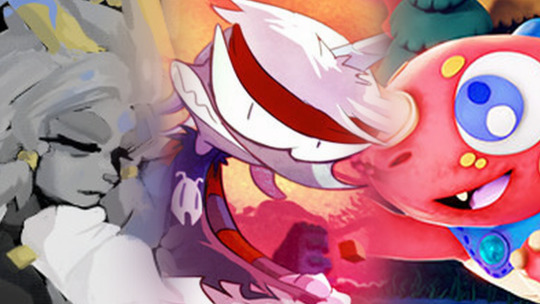
Pseudoregalia
Let us muse over a very small, three-dimensional Metroidvania game stylistically fashioned after the Nintendo 64 era of graphical fidelity. It stars a deliciously polygonal rabbit-y, goat-y, cat-like girl.
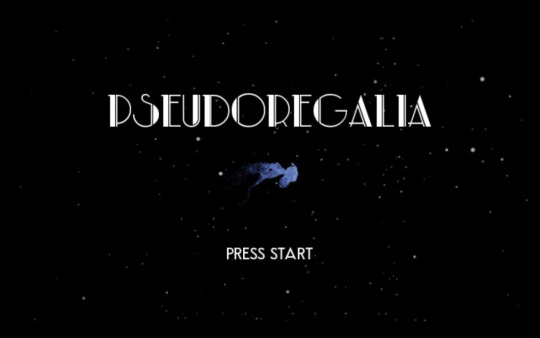
Now, I am playing this on the fabled Steam Deck. It runs and controls smoothly on the platform but you might require to fiddle with the video settings as the default configuration is slightly blurry due to a very specific and fascinating reason. It turns out Pseudoregalia vaunts a certain level of depth in its technical customization, one that's surprisingly fun to manipulate. There's an option to toggle on or off a retro graphical scale and character movement rate, which graciously emulate the old school console experience. You can also manually reduce or augment the maximum framerate for the whole game. You could theoretically play something that looks like a 30 fps 3D Platformer from 1997 or the most HD upscaled version thereof at 144 fps, or everything in between! The default, blurry configuration comes as a result of the aforementioned retro scaling clashing with the 4K resolution in full screen mode. This is the first and last time in recorded human history that I will ever be this enamoured with "specs talk."
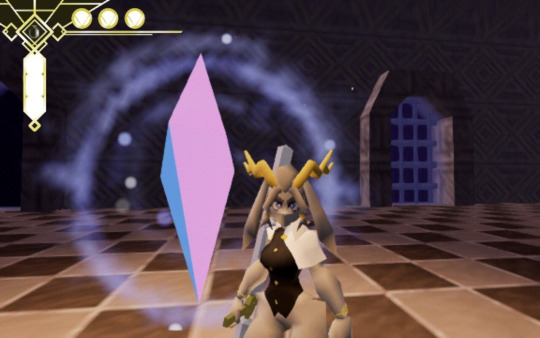
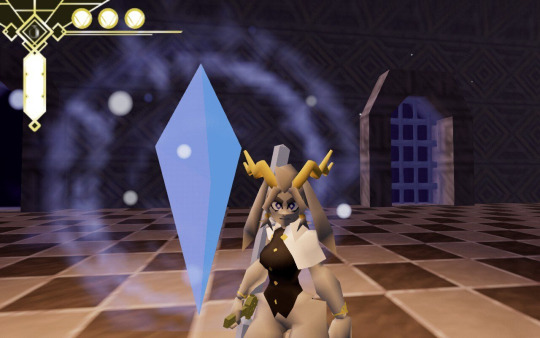
The point is, we have a darling gem with a cultivated aesthetic, a good level of polish: it will look "right" regardless of your favoured settings. I'm impressed by the extra layer of work placed in the subtle use of limited framerates for the character's movement.
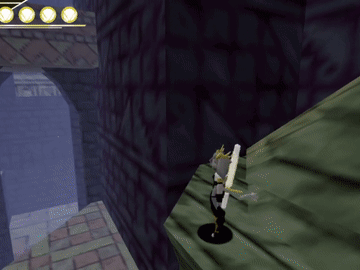
Pseudoregalia captures the idea, the abstract concept and low-poly charm of a N64 title with a gameplay that recalls your memory of it, rather than the unwieldy reality. I say this as someone who doesn't have nostalgia for early 3D graphics: the game makes them look spiffy.
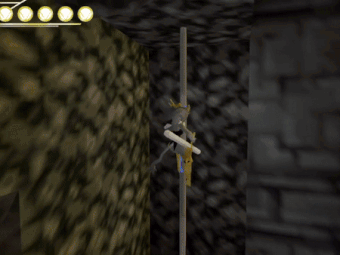
I shall be honest, this is normally not the sort of title I would enjoy playing, as precise platforming and traversal puzzles are my nemesis. I mentioned afore the level of polish, which is generally consistent, but some of the movement upgrades you get (such as the jump/wall kick) can be rather finicky to master. In that sense, be wary that the game does not openly provide you with tutorials for the moves that require more finesse, choosing instead to hide an additional set of instructions in the inventory descriptions. It's "old school", you see. Older versions were bereft of maps thus making exploration a burden for those like me who are directionally challenged - both in games and in real life. Regardless, I kept getting drawn by its world, its somber atmosphere, its tight gameplay and especially its protagonist, Sybil.
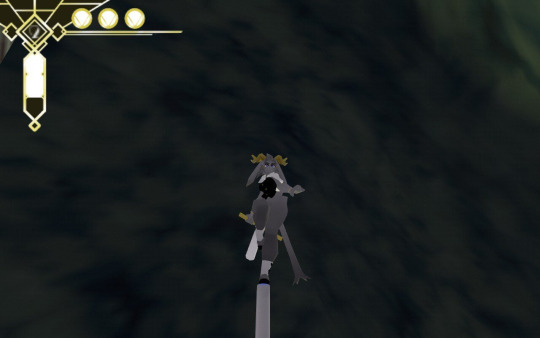
An appealing design for your avatars goes a long way in ensuring an emotional connection to them and Sybil just so happens to have one of the most striking and instantly recognizable appearances I can fathom. It's a pleasure to look at her go! Furthermore, I would posit that she has a lot in common with my precious videogame fluffy boy, Klonoa - and I do I mean, a lot. I will not elaborate. If you get it, you get it. In conclusion, Pseudoregalia is an impressively put together jam. It's easy to pick up yet punishing to handle, it's fun and fascinating in spite of its more irritating aspects. The best overall critique I can give it is that it made me want to keep trying, and trying, and trying, until I eventually became good enough to complete it several times and even beat the insanely hard Time Attacks. In short: game is good. Play it.
---
Corn Kidz 64
If I had a nickel for every time a throwback 3D Platform game starring a cute goat-like creature managed to grab my attention, I would have a whopping three nickels! Anyway, here is Corn Kidz 64, an artistically verosimile homage to the Rareware games you probably remember.
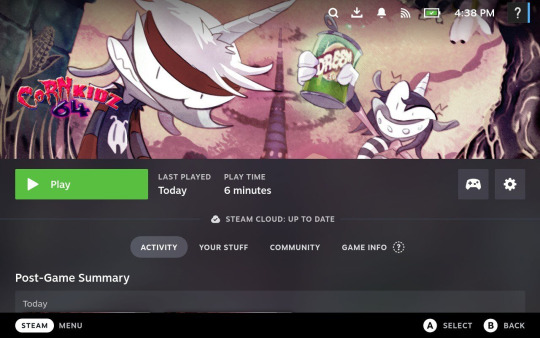
Deliciously stylized polygons welcome both you and I into a quirky mindscape. You play as a rude little prick named Seve who's having a vivid nachos related dream but has to contend with various bollocks - as it's often the case.
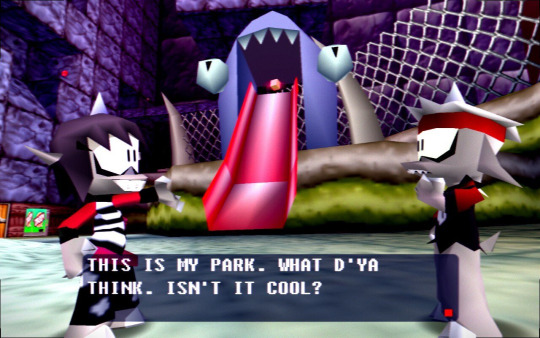
If you are even marginally familiar with all the Kanjo-Bazooies and Konkey Dongs out there then you will recognize its sphere of influences right away. It's a proper tribute to that era of gaming up to the inclusion of the "correct" low video resolution settings and insane completion requirements. There is much puzzling and platforming to be had, tactical traversal and secrets-within-secrets to bamboozle and titillate your gamer's lizard brain. Genre freaks will feel very welcome here.
I will say that I find the character design especially pleasing. Aesthetically, I would place it somewhere in between Rayman. Belgian comic book artist André Franquin and web strips from twenty years ago or more. It's expressive, to say the least.
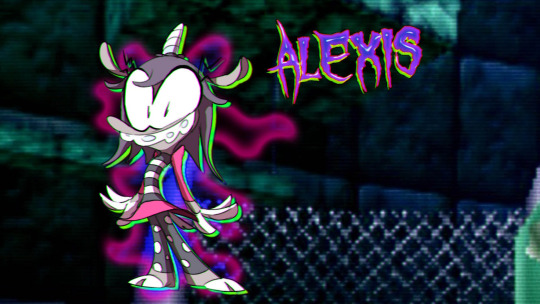

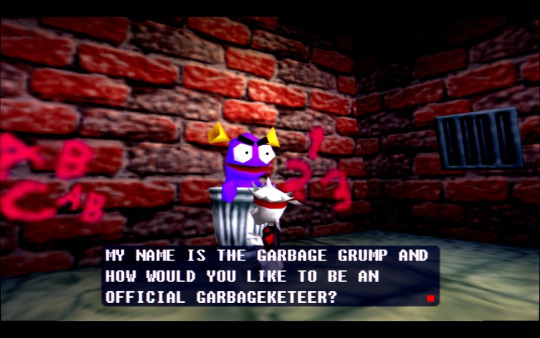
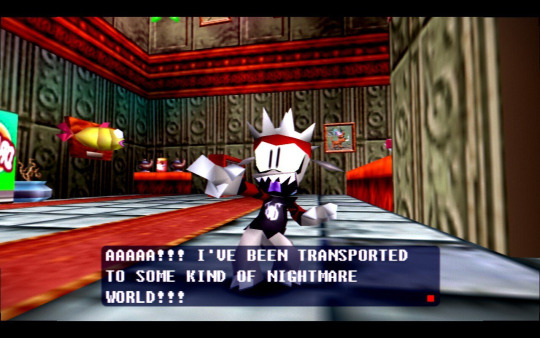
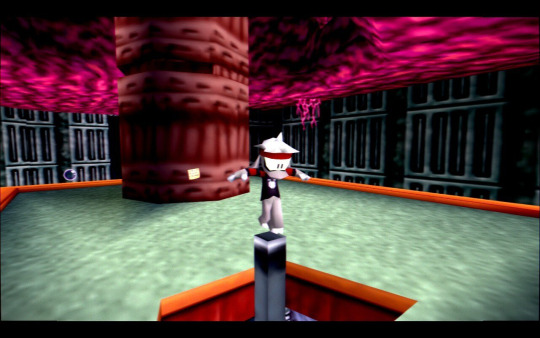
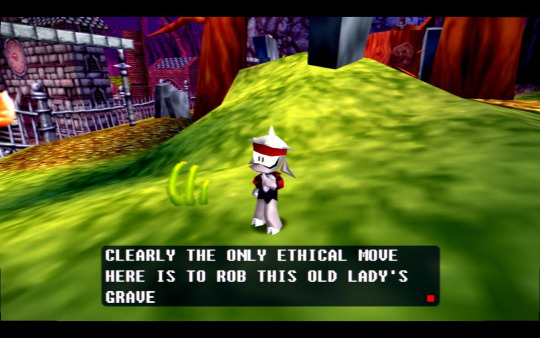
As a sign of good will from the game's part, this is the track that greets you as you plunge into the realm of your dreams of childhood:
Corn Kidz 64 is a short, fun experience, bedazzled by tight controls, surreal atmosphere and "Early Internet" humour. It does not overstate its welcome and only occasionally gets immensely frustrating. Its dedication to the N64 ethos is both a boon and a detriment, in that sense. Let me put it this way: I shall not be doing a 110% completion run any time soon.
---
Cavern of Dreams
As a direct result of me wanting more, here is Cavern of Dreams. Yet another N64 aesthetically driven title that came out last year but was promptly overshadowed by Funny Goat Game and Sexy Goat Game - as far as my own pop cultural myopia is concerned, that is.
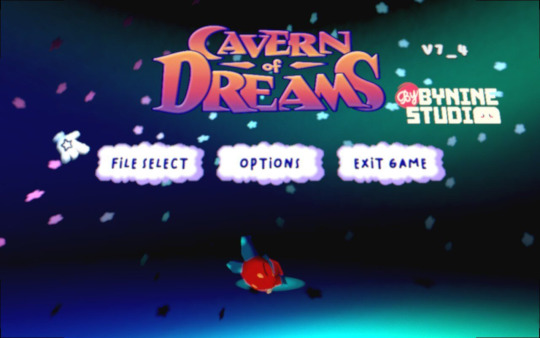
It is a small yet multilayered Collect-A-Thon with an emphasis on exploration rather than combat or complex platforming. There is no health bar and there are no traditional enemies. There is a handful of puzzles here and there, some of which might be legitimate head scratchers. The dragon baby is cute. I do have a couple of gripes with this one.
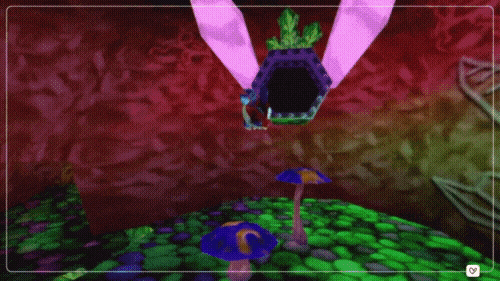
Playing this game is, in a word, annoying. It is bothersome how weighted and limited the movement is, it is fastidious how the character collision is in relation to the environment, it is aggravating how it all affects the gameplay in small yet noticeable ways. Here's an example: you can use the traditional ground pound to gain extra height. However, in order to do so, you have to keep pressing the attack button while in midair. The problem with that is the game still registers it as an attack when you do so. As such, if you happen to be hugging a wall, atop a small ledge, this action will inevitably cause your character to hit said wall and propel you backwards, resulting in you falling to your doom. This happened constantly. Generally speaking, the control scheme doesn't feel ideally tailored to an experience that requires precise platforming. A repeated offender would be grabbing onto climbable ropes. Which is to say, sometimes it just doesn't happen. You'll float towards a rope and, if the collision isn't pixel-perfect, you will miss it entirely. Also, Baby is unable to jump above once he climbs all the way to the top, half the time. The later levels are worse in that regard as they need some amount of skill.
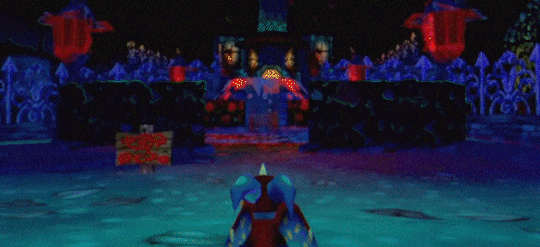
Speaking of which, something that will always make me consider quitting a game in a fit of rage is being sucked down a drain that expels me into a different area, forcing me to walk all the way back to where I was before. Once again, annoying is the word.
All that said, the saving grace of Cavern of Dreams lies in the exquisitely crafted, imaginative stages that compose the dreamlike tapestry of the game's aesthetics: living airborne vessels, desolate ice kingdoms, nightmarish art galleries that twist and distort your senses.
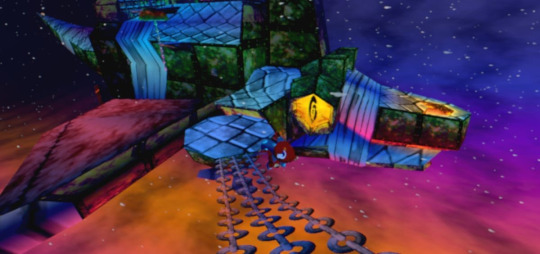
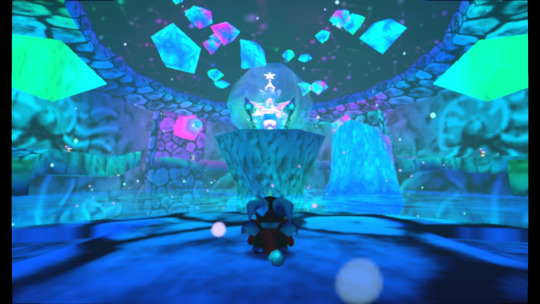
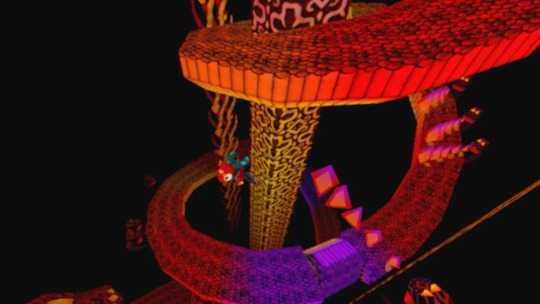
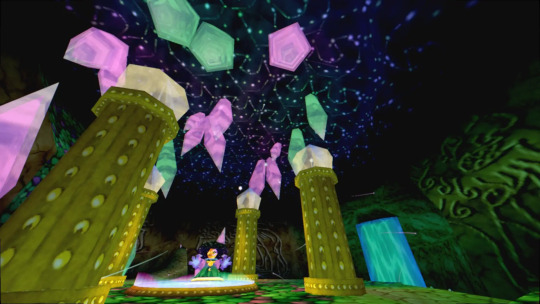
The use of colour hues, sounds and deliberately non-contiguous spaces create this palpable atmosphere of both wonder and anxiety. A welcoming world may turn weird and alienating. A dream may turn into a nightmare. There is a depth beneath the surface presentation that is absolutely worth experiencing. I really wanted to like this game but, alas, I'm left with mostly mixed feelings. Regardless, it's an adorable title with some tinges of darkness and it might just be for you!
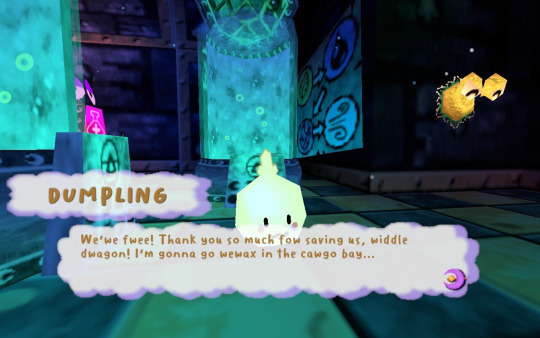
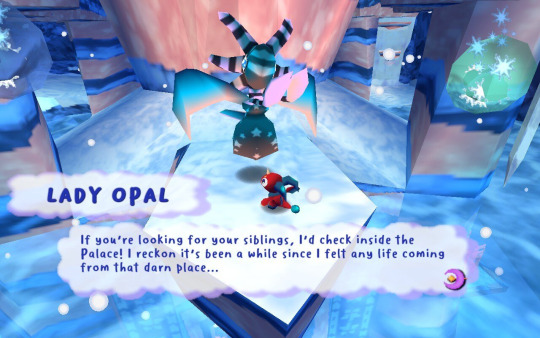
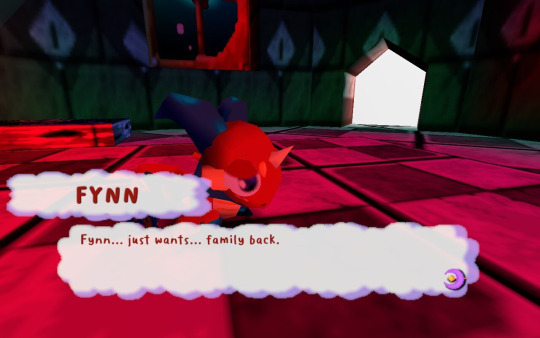
---
As a conclusive note, I find myself enthralled by the subtle similarities these games share as well as their abundant differences. All of them are stylistically reminiscent of a specific bygone era whilst being perfectly distinct in presentation, and they all are about Dreams...
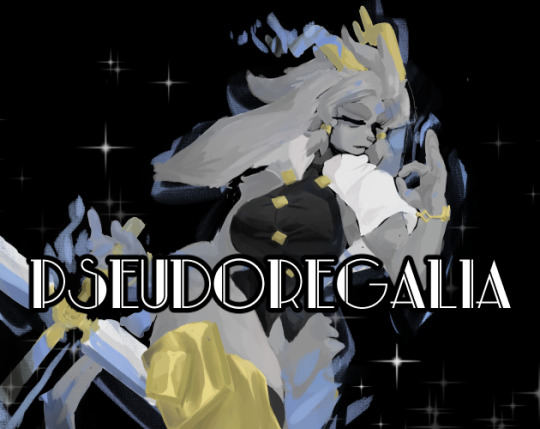
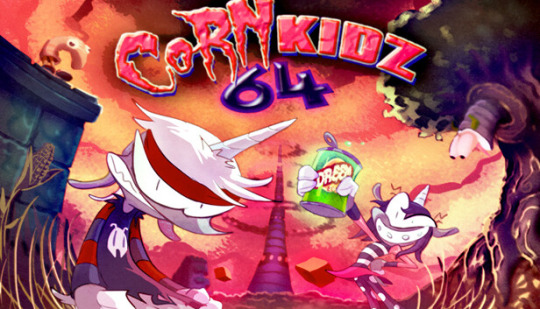
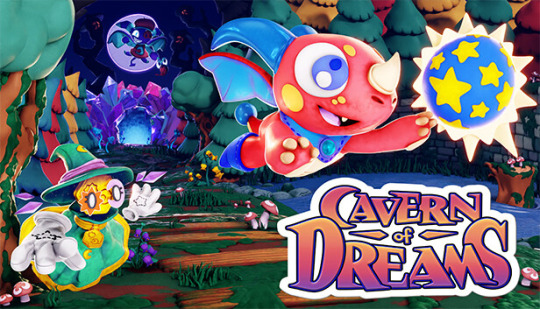
They are about exploring dreamscapes, lands where subconscious thoughts and memories materialize in daunting vistas of a forlorn past, comically bizarre hyper-realities from an active imagination or an infant's idea of the world around itself. Pondering about the familiarity of it all fills me both with comfort and melancholy: the parallelism of Dream, Childhood and Gaming. The distant memories of youth in correlation to the experience of videogame escapism are akin to a dream from which we are expected to wake... Well, now I just want to gush about Klonoa again!
In fact, I would go as far as to say that Corn Kidz 64's "plot resolution" feels like a direct parody of Door to Phantomile's ending, and it gets funnier the more I think about it.
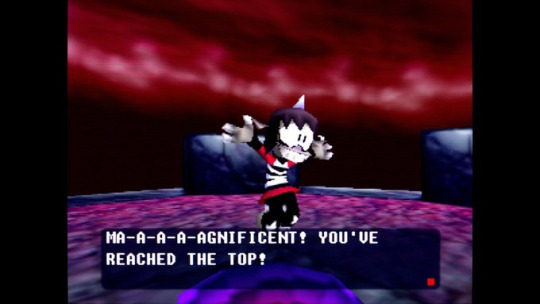
---
A/N:
Thank you for reading.
Follow Madhog on:
YouTube Twitter Bluesky Blogger
#twitter#corn kidz 64#pseudoregalia#cavern of dreams#dreasm#klonoa#platforming#3d#n64#steam#review#master recs
22 notes
·
View notes
Text
Both are Possible

-Welcome to my day five entry for the Arcane Parenting Week event. I had a very difficult time choosing today's theme as I had a solid idea for each but ultimately went with "Duality"
"C'mon! Ya can do better'n that! Focus!"
"I'm-I AM!"
"No you're not, I've seen ya do it before!"
This rapid-fire exchange happened in between punches in a secluded side alley behind the Last Drop, one that had become Vi and Vander's 'gym' as he trained her in the fine art of hand-to-hand combat.
Her small hands were wrapped with multiple layers of rags for cushioning as she faced her arch nemesis of...Vander kneeling while wearing an old pair of boxing gloves. They'd been at it for a while and she was visibly beginning to tire, though she swore she was still 'ready to kick his butt.' She dug in her heels for power before lunging forward and swinging at his left hand-and his right came around to carefully but swiftly knock her on her backside.
She lay there, cursing and panting while he sighed, "I keep tellin' ya to watch, think ahead. Your opponent'll probably 'ave two hands ya gotta anticipate and guard!"
"Ugh!" she spat with frustration, slapping the ground and raising puffs of dust before clambering wearily to her feet. Wobbling a little, she wiped the worst of the dirt and sweat from her face and moved herself into a starting stance, "Yeah yeah I know! Let's go!"
Vander paused; he could see her unsteadiness, the exhaustion setting in, how she was fighting to well, keep fighting, though the fiery determination in her blue eyes was no dimmer. Her body was clearly at it's limit, and if he didn't put a stop to this he knew she wouldn't. Frowning, he stood, removing the gloves and she tilted her head curiously.
"We're done for now." he declared, and she instantly stomped her foot, ignoring how that simple act made her lose her balance for a moment.
"Bullshit!" she spat, taking her stance again, "I'm not done yet!"
"Yes, ya are. You're barely able to stand right."
"I'm fine! Fight me old man!" she shouted, darting forward and taking a swing at him. He easily caught her fist in his much larger hand, holding gently but tightly as she struggled.
"Violet!" he barked harshly, and she froze at his tone, glaring indignantly at the ground.
In that same tone he continued, "Ya know what happens when ya keep pushin' yourself? Ya get injured, then ya can't fight at all, or take care'a yourself or anyone else, and then what eh? Survival ain't just about bein' strong ya gotta be smart too! Ya gotta know when to fight 'n when to rest! So be smart and take a breather!"
He let go of her hand now and she stepped back, albeit shaky and crossed her sore arms, trying not to let him see her wince. He was right, he always was, as much as she was loathe to admit it. Exhaling loudly, his own annoyance gone, Vander knelt again and spoke much more gently to her.
"Ya know I give ya grief 'cause I care 'bout you guys, right? This city, this world is cruel, and it'll eat ya alive if you're not ready. All I want is to give ya a, pardon the pun, fightin' chance."
Vi nodded, still silent but her anger was gone, slowly being replaced by the fatigue she'd been trying to ignore. She knew he loved them, and her young mind was just beginning to grasp the concept that sometimes, people did things you didn't like or want because they knew it wasn't what you necessarily wanted, but might need.
"Truce?" Vander questioned softly, holding out a large, calloused hand, and she finally gave him a half-smile, stepping forward and taking it, "Yeah...I'll get you next time though."
"Ya can try, ya little firecracker," he gave a deep chuckle, carefully scooping her up and holding her against his shoulder as he turned, "Let's head back and get ya some ice."
She wrapped her arms around his neck, melting into him and feeling his strong hand soothingly rub her back-
And not for the first time, it flashed across her mind the first times she'd seen those hands...raised in the air as he shouted and rallied a large group of also angrily shouting people, wreathed in iron and pummeling men into the ground, then suddenly much gentler as they carried her and her sister away from the horror...
Dabbing alcohol on their wounds, making them food or getting them drinks, testing their temperatures when they were sick, providing a hug or encouraging pat and everything else...she knew he'd done a lot of scary things with those hands, and the duality of that against how he was with them all and how he was being now wasn't entirely lost on her...but she didn't care. All she knew was he loved and cared about them.
And that's what mattered.
#arcane#arcane netflix#arcane fanfiction#arcaneparentingweek#arcane vander#vander arcane#arcane vi#vi arcane#fluff and feels
29 notes
·
View notes
Text
(love) is a heartache
@drarrymicrofic prompt: hope is a heartache - léon
let it be known that harry goes through life purely on vibes. half of his reasons why for every decision at his big age are “idk imma just hope for the best”
ao3
People’s hearts twinge sometimes. For Draco, he can barely remember the last time he doesn’t have these twinges. It’s pretty normal at this point.
“No, it’s not,” Pansy says. She’s a Healer, so she’s probably right. But Draco prefers to ignore that.
“Leave it be,” Draco murmurs, lips against her scalp, “I’m fine. Say, are you free tomorrow?”
“Yeah. You want to go somewhere?”
“Mm. Sleep.”
They go out the next morning, Pansy in thick makeup and Draco practically drunk under nine layers of Charms. The air is a bit humid, which seems to get worse when the bustling street intensifies in volume into a roaring din. Pansy pulls him under an awning, yanking at his sleeve a bit to try out her disgusting sugary coffee. She always does this whenever she wants to take his attention away from something, which means he just has to look at exactly where she’s doesn’t want him to. As his lips wrap around her lipstick-stained straw, he glances up.
Across the street, a couple strolls through a gushing crowd. Fiery red hair, airy laughter, a pale arm wrapped around her fiancé’s waist. Curls of black, sleek spectacles, a protective palm on his fiancee’s shoulder. They make the perfect picture, a vibrant oil painting. Their existence is formed from bold strokes of sunlight and starburst kisses, with the focal point being a shock of phthalo green and cadmium lemon, two minute specks that make all the difference. As all good paintings do, they pin the viewer on the spot, as if the viewer himself is a thing to behold. Then they shift away.
The exhibit moves forward and out of sight. It’s closing time, the viewer has overstayed his welcome.
Something leaps in Draco’s chest and splatters on the floor of his stomach. Placing her hand over his heart, Pansy frowns at him. She doesn’t ask why Potter stared at someone who looked like a stranger to him. Only tells him to start finding answers.
Months later, on the most awaited day in recent Wizarding history, there’s a knock on Draco’s door.
He throws on a sweater, and a throw, too, for good measure. Ambling to the door, he checks the mail slot before peeking through the peephole. Nobody but a package is outside. Draco hums and unlocks his door, crouching down the moment it opens. What feels like soft satin brushes against his cheek, cool and smooth. With a flash, a pair of shiny dress shoes appear before him.
“Draco.”
Draco peers up as he rises, hands around the package. Potter has his maddening Invisibility Cloak slung over his arm, his roguish charm heightened by a perfectly fitted three-piece suit. A tiny posy is pinned on his left lapel, muted green hellebores with a few sprigs of privet berries. He’s dressed like a man in love.
Draco feels something he hasn’t felt in months at the sight. He’s trained himself to suppress it the moment it showed itself and has been relatively successful until now. The sting, without warning, bursts from within his chest, calling forth a slight wince. Potter’s brows furrow.
"How do you know where I live?"
“How long has this been going on?”
Draco frowns. “Pardon?”
“That,” Potter gestures at Draco’s chest. “The heartache.”
He rears back. What the hell is he supposed to say to that? At Potter’s unchanging expression, Draco shoves his hair out of his face with a quiet huff and puts a hand on the doorknob.
“It’s none of your business. Please leave.”
“It is, actually,” Potter stops the closing door with one arm.
“Excuse me? We haven't had a proper conversation in more than a decade and suddenly you want to act like we're friends? Leave, now.”
“Listen to me. How can it not be my business when I feel it, too?”
“Check with a Healer, then. If you can put past grudges aside, I can hand you Pansy Parkinson’s business card,” Draco grits through his teeth, pushing against the door with his entire body, his throw slipping to the ground.
“Draco, stop, I already know, stop.”
“Know what? No, I don't care. Leave at once, else I’d alert the Aurors.”
A rough slam sends Draco staggering back. Potter pants, hard lines on his face. His chest heaves under his crisp white shirt, its top two buttons unclasped, and he steps over the threshold, closing the door.
“You think they’d believe you?”
The pain shoots from his chest to the rest of his body, and for several seconds, his lungs wouldn’t work. He whips his head away from Potter, who groans and sags against the wall.
“I told you to leave.”
“I’m sorry, that was a shitty thing to say,” Potter says immediately, sweat dotting his temples.
After an uncomfortable pause, clearing his throat, he picks up the near-forgotten package from the carpet. His hand feels around the outline of the object within, rectangular and heavy. Glancing at Draco, he says hoarsely. “I know why you bought this book.”
“Know this, know that, you know nothing,” Draco lunges forward, only for Potter to twist out of the way and raise the package out of his reach.
“The Life-long Burden of Dark Curses: A Caution by Elise Arrowlane, limited edition,” he says, unbothered by Draco’s slackened jaw. “You ordered it from the new bookstore on Diagon months ago. You were small and old and grey, but I recognized you. I always could.”
“Okay,” Draco sneers, “so you’re a stalker. Old news. Anything else?”
“There’s no need to order one. I would’ve borrowed it from Hermione if you had only asked,” Potter says. “Instead, I got curious and read it for myself. That’s how I connected the dots about the heartache, how I realized we’ve both had it since that day years ago.”
“Oh, the day you slashed me into ribbons and almost cut through my heart?” Draco clenches his jaw.
Being able to shout this ugly kind of truth into the perpetrator’s face feels oddly liberating. That is, if liberation also comes with a specific kind of agony that makes Draco want to fall to his knees.
“Dark Magic leaves a mark on both the wizard and their victim, doesn’t it? No need for a book to tell us that,” Potter says, the harsh afternoon glow of him gentled by the soft lamplight in Draco’s hallway. “In certain cases, it even leaves a link. A connection.”
Draco bites the inside of his cheek and looks away. The only consequence from that horrid night was his fucked up heart and nothing else, nothing at all. Whatever Potter is insinuating, he hates it. He hates this. He hates him.
“How are you so sure there’s a connection.”
“I wasn’t,” Potter says. “The Healers said it’s a health thing I developed after the War and I just needed to avoid strenuous activity. I didn’t think much of it, but then I read the book and realized that it usually flared up whenever you watched me.”
Scoffing, Draco turns and stalks into the kitchen. Walking past the boiling kettle, he throws a cabinet door open and grabs a mug, his hand trembling.
“Interesting how my health suffers when I see the bastard who quite literally carved me open.”
“I was eating dinner when I thought I was going to die of a heart attack at 23,” Potter continues. Draco pulls the drawers out, unable to find a single bag of tea for several excruciating moments. “The next day, I was reading about your mother’s death on the Daily Prophet. That was the first sign.”
Grabbing a rag and wetting it, Draco wipes the countertop even as he’s just done so last night.
“When Ginny saw you on the street during our date and extended her hand toward you, you shook it. But your heart ached.
“I saw you looking at the picture of Ginny and I kissing on the front page of Witch Weekly. Your hair was brown and your back was curved, but I saw you. Your heart ached.
“When I announced my engagement to her on the Battle of Hogwarts’s 10th Anniversary, you were clapping along with everyone else. But your heart ached.”
Draco throws the rag on the counter. The kettle whistles, a piercing sound. “What’s your point? Are you here purely to flaunt your relationship and imply that I’m in love with Ginevra Weasley? If so, I got it. Thank you so very much, it’s been enlightening. Now get out.”
“The point is,” Potter says, lifting the kettle off the burner to pour it into Draco’s mug, placing his tea bag in, “unless the article about you being gay was wrong, Ginny isn’t the one you’re in love with.”
“What arti—” Draco stops. “That was years ago.”
His sexuality was leaked to some irrelevant gossip rag, not even making the front page. Nobody noticed, nothing changed, and it hasn’t entered his mind in what feels like forever until Potter reminds him.
“I remember.”
“You—” Draco frowns. His eyes strain on the cup of tea until they hurt. He squeezes them shut, sighing. “It doesn’t prove anything. Perhaps I’m jealous of my childhood nemesis having a better life than me, ever thought of that?”
“Yeah,” Potter says, “I’ve thought about this a lot. Which is why I’m here. To make sure.”
Draco takes it in, then, unable to help himself, curls his lips at Potter and his attire. At his artfully gelled hair, his hanging bow tie, the elegant boutonniere on the lapel of his dark blue suit. His empty ring finger.
“Couldn’t you have chosen a better date to make sure? Preferably before your wedding day?”
Potter steps closer. A respectable distance away, but closer.
“I could’ve, but I spent most of those days in denial. Then the dots connected and I couldn’t deny it anymore, so I decided to just go through with the wedding regardless, be with the woman I loved. Hoped that maybe the odd emotions I had would go away,” he shrugs, raising his eyes to meet Draco’s. “Saw Ginny at the end of the aisle and, well, I couldn’t stop thinking that it should’ve been someone else. All this time, I’ve thought that she didn’t feel… right in my arms, but I pushed it down. And there she was in that white dress.
“Seeing that today was the last straw. I had to leave.”
Draco’s breath catches in his throat. Swallowing it down, he grabs his mug, scooping out the tea bag just to have something to do. He takes a sip without blowing, ignoring its scalding heat.
“That was stupid.”
“Yeah.”
“You’re so fucking stupid,” Draco can feel a headache building. “That was a horrible decision. I never imagined you—you!—out of all people, could be this irresponsible. What the fuck.”
“You’re right.”
“Of course I am. Merlin, that poor fucking woman. If your purpose here is to make me feel bad for Ginevra and all 300 of her relatives for once in my life, you’ve succeeded, congratulations.”
“I’m sorry.”
“Don’t say that to me, say that to—oh, you’d do what you want no matter what I say, wouldn’t you?”
“Depends on the situation.”
“‘Depends on the situation,’ he says,” Draco mocks, getting a carton of milk from the fridge to save his bitter, bitter tea. Potter doesn’t reply. Stirring the milk in, Draco lets out a heavy sigh.
“What do you want me to do about this?” He says. “I didn’t make you run out of your own wedding. If you expect me to take the blame for your inane decisions, the first person I Floo wouldn’t be the Aurors, but Ginevra Weasley herself.”
A small smile graces Potter’s lips. “I don’t expect anything from you but honesty.”
Draco squints.
“And how will you know if what I say is a lie? Will you reject my genuine answer if it’s not what you want to hear?”
“That won’t be a problem,” Potter says. “I trust your heart will speak the truth for us both.”
There’s a pang in Draco’s chest, and judging from the twitch of Potter’s brow, he can feel it too. Not another word is said, the two men merely facing each other from across a tiny kitchen, considering. Draco can feel the warmth of sunlight beaming through the little window and coating his nape as he leans against the sink, earl grey on his tongue. Lovely citric notes of bergamot drift up his nose. He closes his eyes. What to do, what to do.
Weightless oxfords clack against the yellowed tiles, clear and bright in Draco’s ears. Fabric rustles as Potter slips a hand into his pocket only to retrieve it a second later. Draco lets himself be cornered, barely glancing at the wool-clad arms caging either side of his waist. A clink catches his attention, however, and he tilts his head to the left.
Millimeters beside Draco’s hand on the counter, glinting in the sun, is a wedding band. Draco knows Potter and Ginevra’s in and out, has examined the picture on that day’s issue of the Daily Prophet more times than he should have. He knows the marquise droplets of Ginevra’s gems and the chevron curve of her ring, the blankness of Potter’s own band a dream and a question in his mind.
The band that’s resting on the counter is different. Rustic gold and a fissure in the middle, the fertile earth splitting open to reveal a stream of diamonds, a sparkling river. Draco sets his mug to the side and holds the ring up close, his finger smoothing over the grooves of its texture.
“Did you make a stop at a jewelry store before breaking into my home?” He asks.
“No,” Harry murmurs. Draco looks at him in surprise. “I’ve had this with me for months.”
A pause.
“I thought you said you were in denial.”
“I was, but I knew, somewhat, that I wanted someone else,” Harry’s head lowers, slow and careful, until his forehead rests against Draco’s shoulder. “I told myself that I just liked the way it looked, had to get it in case I didn’t want the other ring anymore. But I got it a size smaller. Been carrying it in my pocket ever since.”
Draco’s heart throbs and throbs. Large hands circle his waist, bunching up the back of his sweater and pressing him close, chest to chest. A blanket of pure heat envelops his body as he breathes in the timeless saffron and neroli of cologne, half-lidded eyes pinned on the band he’s given. Oh, dear, he thinks, and again when it settles at the base of his ring finger with ease, as if it belongs there and never left. Oh, dear.
#drarrymicrofic#drarry#drarry fanfiction#drarry fanfic#harry potter#draco malfoy#yeah erm harry isn't the brightest bean in the pod or whatever that saying goes#they'll work it out i promise#draco's idea of a first date would be dragging harry over to the weasleys and forcing him to give ginny a formal apology#like ok he doesn't care about her at all but having this woman's unhappiness on his conscience is unbearable#also i really like the idea of the sectumsempra fucking up draco's bodily functions#the scars are really cool but i especially like it when the consequences are idk more visceral and clearly lower draco's quality of life#im not gonna get into the whole connection thing bc idk either#just know that whenever draco feels something intensely#like grief fear jealousy and ooooh heartbreak#his heart throbs and harry also feels it#in this fic harry's secretly happy that despite the whole shitty heart thing there's an unbreakable connection between the two#he needs some work in this fic but he means well i assure yall#draco seeing harry canoodling w ginny and feeling his heart hurt: that was weird haha#joonkorre writes
57 notes
·
View notes
Note
WE ALL FALL DOWN
WE ALL FALL DOWN- No one is safe in the end of my muse’s story. Everyone important to the story has perished. This can include your muse or not.
One by one, the Autobots were defeated on Earth. One by one, he helped lay their body (if available) and their memory to rest. With each one, Ratchet’s spark continued to break from the hopelessness and anger toward limitations caused by the morality that he once treasured so dearly. He had already slowly broken his medical oaths during the war, he did not want to, but he did, out of pragmatism. When he finally lost everyone, when he had nothing left but burning agony and rage, his struggling desire to continue to try to behave ethically was crushed. No unstable chemical concoction was required, just the right circumstances, just the right amount of pain without comfort and understanding.
With ethics set aside and revenge he considered justified on his heart, he focused solely on what he could do with his knowledge, what he was truly capable of to get the results he wanted, no matter how he reached those results. The most effective, solo plan he could conceptualize formed, and he began to work on the schematics necessary. He assumed he had the time. Without a team, without warriors, why would an old worn down medic that was only occasionally scrounging to survive be among the Decepticons’ priorities?
Unfortunate vehicons were first on his agenda, acquired slowly when they wandered just a little too far from their companions in mines while he also retrieved energon crystals for his own fuel and work. Their armor and components were striped, slowly crafted and transformed into a dark battle suit, an extra layer of defense, because the alloy was still stronger than anything he could acquire on Earth. The process bothered him at first, but it became easier as he continued, convincing himself it would be worth it in the end.
He knew that it was wrong, that it was horrible, that a younger him would have recoiled in shock, but he could not see it as worse than raising the dead, and there was no one left that he cared for to disgust.
In addition to being an extra layer of armor, it was expertly designed to mimic one of the larger classes of vehicons in appearance (side note: this is inspired by the different forms of them in the wii game). Blending in would have been significantly more difficult as a bright ambulance after he managed to travel with other vehicons back onto the warship, and he did need to blend in well to stand a chance of reaching the Nemesis’ vault. All he wanted was the phase shifter, he did not need anything else for his intentions, and his medical tools made short work of breaking into said vault. He found what he wanted, and as a back-up, he took the polarity gauntlet as well. Why not? It would make things significantly less complicated.
Wielding magnetism and the ultimate defensive ability of phasing through laser blasts, he wreaked havoc. He polarized, pinned, dissembled, and destroyed with medical precision and total disregard for honorable combat. The vehicons, seekers, and insecticons were not among his priorities (he wanted the leaders and officers, the ones he blamed for taking everyone he loved), but they faced his wrath nonetheless. When the last spark chamber was phased from the last chassis, and ripped apart magnetically by his hands, his last objective was the ship itself. He ruined its fuel and engines, and waited, patiently, as it dropped from the sky.
He survived the devastating crash; the phase shifter allowed that without issue, but few remaining servants of Megatron did, and he did not care about them. He was finished. He had done what he set out to do: end it all.
But it changed nothing as to how he felt when he was alone again later. It did not bring anyone back. It did not erase his pain and emptiness. Only he remained, trapped on Earth, unable to return even to a wasteland of a home that he could never restore on his own, because Decepticon engineering was no longer available. But, humanity would survive, at least. It was not enough to fill the void of his spark, not enough justification for what he had done now that it was over, yet it was something. An excuse to give himself for his unbridled rage and actions.
Perhaps he would go rust in a junkyard, after turning off his commlink so Fowler could not continue to yell his questions upon discovery of the crash. He was alone, he accepted and wanted to remain alone. He wasn’t going anywhere else, nor had anyone else to go to, or take care of. He was no longer worthy of being considered a trustworthy caretaker, even if there had been, and he knew it. He was done, but maybe small organic life would see fit to use him as a home and nests once he entered stasis. At least that would be a useful fate to some lifeforms.
#alright this is the last one this and the previous one were very difficult for me conceptually trying to follow the prompt it is BREAK TIME#and i admit this had influence of the domestic nerd goes feral trope from b.tas mr freeze and doc oc from my childhood#[QUESTION] distract me so I stay inside#[ORION | LUMINANTREVERIE] when you and I are alone I've never felt so at home#death tw#angst tw#long post#[DRABBLE]
5 notes
·
View notes
Photo
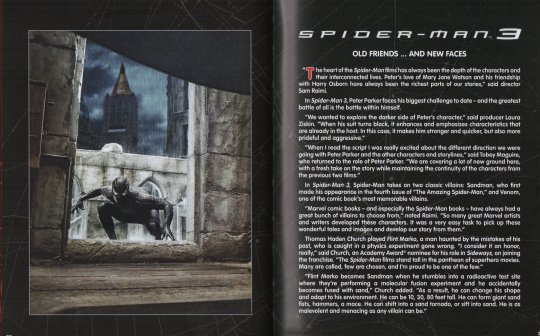
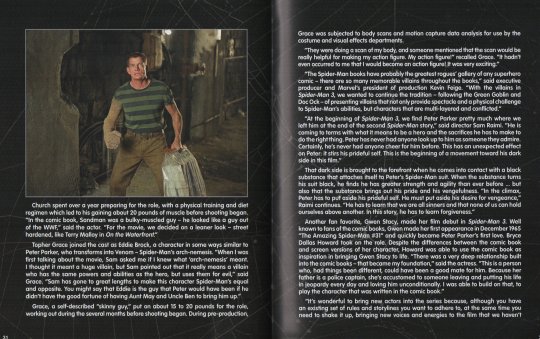
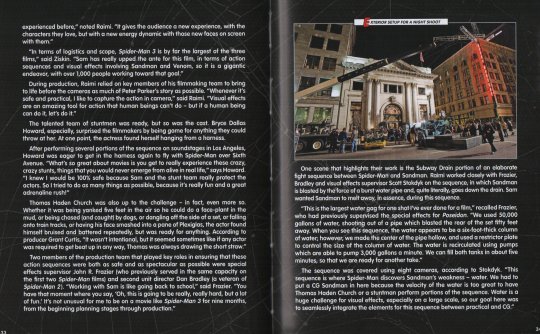
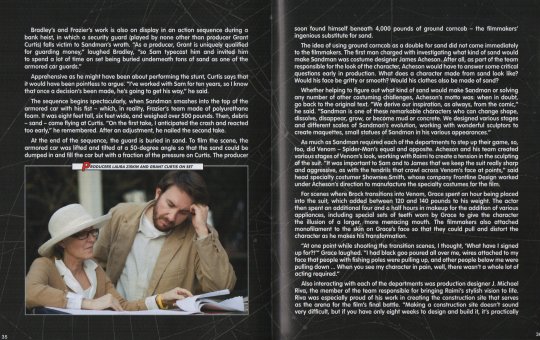
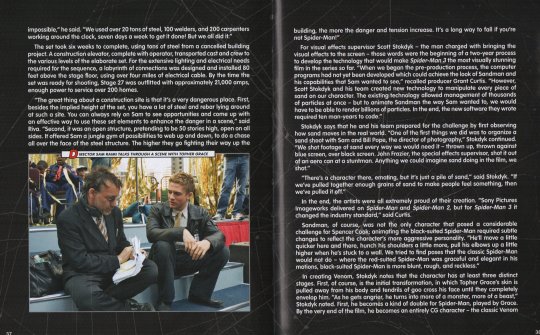
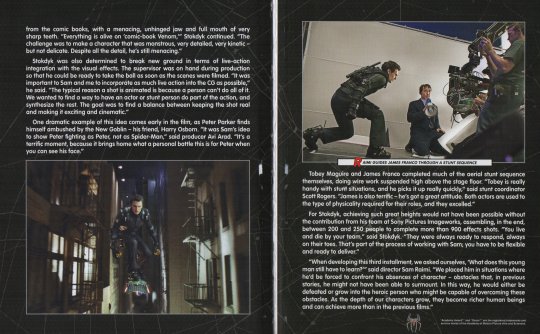
From the booklet which comes with the Spider-Man Trilogy Limited Edition Collection blu-ray!
This talks about the making of Spider-Man 3, here’s the bit about the first Spider-Man movie and here’s the bit about Spider-Man 2.
Click for a transcript:
OLD FRIENDS… AND NEW FACES
“The heart of the Spider-Man films has always been the depth of the characters and their interconnected lives. Peter’s love of Mary Jane Watson and his friendship with Harry Osborn have always been the richest parts of our stories,” said director Sam Raimi.
In Spider-Man 3, Peter Parker faces his biggest challenge to date – and the greatest battle of all is the battle within himself.
“We wanted to explore the darker side of Peter’s character,” said producer Laura Ziskin. “When his suit turns black, it enhances and emphasizes characteristics that are already in the host. In this case, it makes him stronger and quicker, but also more prideful and aggressive.”
“When I read the script I was really excited about the different direction we were going with Peter Parker and the other characters and storylines,” said Tobey Maguire, who returned to the role of Peter Parker. “We are covering a lot of new ground here, with a fresh take on the story while maintaining the continuity of the characters from the previous two films.”
In Spider-Man 3, Spider-Man takes on two classic villains: Sandman, who first made his appearance in the fourth issue of “The Amazing Spider-Man” and Venom, one of the comic book’s most memorable villains.
“Marvel comic books – and especially the Spider-Man books – have always had a great bunch of villains to choose from,” noted Raimi. “So many great Marvel artists and writers developed these characters. It was a very easy task to pick up these wonderful tales and images and develop our story from them.”
Thomas Haden Church played Flint Marko, a man haunted by the mistakes of his past, who is caught in a physics experiment gone wrong. “I consider it an honor, really,” said Church, an Academy Award nominee for his role in Sideway, on joining the franchise. “The Spider-Man films stand tall in the pantheon of superhero movies. Many are called, few are chosen, and I’m proud to be one of the few.”
“Flint Marko becomes Sandman when he stumbles into a radioactive test site where they’re performing a molecular fusion experiment and he accidentally becomes fused with sand,” Church added. “As a result, he can change his shape and adapt to his environment. He can be 10, 30, 80 feet tall. He can form giant sand fists, hammers, a mace. He can shift into a sand tornado, or sift into sand. He is as malevolent and menacing as any villain can be.”
Church spent over a year preparing for the role, with a physical training and diet regimen which led to his gaining about 20 pounds of muscle before shooting began. “In the comic book, Sandman was a bulky-muscled guy – he looked like a guy out of the WWF,” said the actor, “For the movie, we decided on a leaner look – street hardened, like Terry Malloy in On the Waterfront.”
Topher Grace joined the cast as Eddie Brock, a character in some ways similar to Peter Parker, who transforms into Venom – Spider-Man’s arch-nemesis. “When I was first talking about the movie, Sam asked me if I knew what ‘arch-nemesis’ meant. I thought it meant a huge villain, but Sam pointed out that it really means a villain who has the same powers and abilities as the hero, but uses them for evil,” said Grace. “Sam has gone to great lengths to make this character Spider-Man’s equal and opposite. You might say that Eddie is the guy that Peter would have been if he didn’t have the good fortune of having Aunt May and Uncle Ben to bring him up.”
Grace, a self-described “skinny guy,” put on about 15 to 20 pounds for the role, working out during the several months before shooting began. During pre-production, Grace was subjected to body scans and motion capture data analysis for use by the costume and visual effects departments.
“They were doing a scan of my body, and someone mentioned that the scan would be really helpful for making my action figure. My action figure!” recalled Grace. “It hadn’t even occurred to me that I would become an action figure! It was very exciting.”
“The Spider-Man books have probably the greatest rogues’ gallery of any superhero comic – there are so many memorable villains throughout the books,” said executive producer and Marvel’s president of production Kevin Feige. “With the villains in Spider-Man 3, we wanted to continue the tradition – following the Green Goblin and Doc Ock – of presenting villains that not only provide spectacle and a physical challenge to Spider-Man’s abilities, but characters that are multi-layered and conflicted.”
“At the beginning of Spider-Man 3, we find Peter Parker pretty much where we left him at the end of the second Spider-Man story,” said director Sam Raimi. “He is coming to terms with what it means to be a hero and the sacrifices he has to make to do the right thing. Peter has never had anyone look up to him as someone they admire. Certainly, he’s never had anyone cheer for him before. This has an unexpected effect on Peter: it stirs up his prideful self. This is the beginning of a movement toward his dark side in this film.”
That dark side is brought to the forefront when he comes into contact with a black substance that attaches itself to Peter’s Spider-Man suit. When the substance turns his suit black, he finds he has greater strength and agility than ever before… but also the substance brings out his pride and his vengefulness. “In the climax, Peter has to put aside his prideful self. He must put aside his desire for vengeance,” Raimi continues. “He has to learn that we are all sinners and that none of us can hold ourselves above another. In this story, he has to learn forgiveness.”
Another fan favorite, Gwen Stacy, made her film debut in Spider-Man 3. Well known to fans of the comic books, Gwen made her first appearance in December 1965 “The Amazing Spider-Man #31” and quickly became Peter Parker’s first love. Bryce Dallas Howard took on the role. Despite the differences between the comic book and screen versions of her character, Howard was able to use the comic book as inspiration in bringing Gwen Stacy to life. “There was a very deep relationship built into the comic books – that became my foundation,” said the actress. “This a person who, had things been different, could have been a good mate for him. Because her father is a police captain, she’s accustomed to someone leaving and putting his life in jeopardy every day and loving him unconditionally. I was able to build on that, to play the character that was written in the comic book.”
“It’s wonderful to bring new actors into the series because, although you have an existing set of rules and storylines you want to adhere to, at the same time you need to shake it up, bringing new voices and energies to the film that we haven’t experiences before, “noted Raimi. “It gives the audience a new experience, with the characters they love, but with a new energy dynamic, with those new faces on screen with them.”
“In terms of logistics and scope, Spider-Man 3 is by far the largest of the three films,” said Ziskin. “Sam has really upped the ante for this film, in terms of action sequences and visual effects involving Sandman and Venom, so it is a gigantic endeavor, with over 1,000 people working towards that goal.”
During production, Raimi relied on key members of his filmmaking team to bring to life before the cameras as much of Peter Parker’s story as possible. “Whenever it’s safe and practical, I like to capture the action in camera,” said Raimi. “Visual effects are an amazing tool for action that human beings can’t do – but if a human being can do it, let’s do it.”
The talented team of stuntmen was ready, but so was the cast. Bryce Dallas Howard, especially, surprised the filmmakers by being game for anything they could throw at her. At one point, the actress found herself hanging from a harness.
After performing several portions of the sequence on soundstages in Los Angeles, Howard was eager to get in the harness again to fly with Spider-Man over Sixth Avenue. “What’s so great about movies is you get to really experience these crazy, crazy stunts, things that you would never emerge from alive in real life,” says Howard. “I knew I would be 100% safe because Sam and the stunt team really protect the actors. So I tried to do as many things as possible, because it’s really fun and a great adrenaline rush!”
Thomas Haden Church was also up to the challenge – in fact, even more so. Whether it was being yanked five feet in the air so he could do a face-plant in the mud, or being chased (and caught) by dogs, or dangling off the side of a set, or falling onto train tracks, or having his face smashed into a pane of Plexiglas, the actor found himself bruised and battered repeatedly, but was ready for anything. According to producer Grant Curtis, “It wasn’t intentional, but it seemed sometimes like if any actor was required to get beat up in any way, Thomas was always drawing that short straw.”
Two members of the production team that played key roles in ensuring that these action sequences were both as safe and as spectacular as possible were special effects supervisor John R. Frazier (who previously served in the same capacity on the first two Spider-Man films) and second unit director Dan Bradley (a veteran of Spider-Man 2). “Working with Sam is like going back to school,” said Frazier. “You have that moment where you say, ‘Oh, this is going to be really, really hard, but a lot of fun.’ It’s not unusual for me to be on a movie like Spider-Man 3 for nine months, from the beginning planning stages through production.”
One scene that highlights their work is the Subway Drain portion of an elaborate fight sequence between Spider-Man and Sandman. Raimi worked closely with Frazier, Bradley and visual effects supervisor Scott Stokdyk on the sequence, in which Sandman is blasted by the force of a burst water pipe and, quite literally, goes down the drain. Sam wanted Sandman to melt away, in essence, during this sequence.
“This is the largest water gag for one shot I’ve ever done for a film,” recalled Frazier, who had previously supervised the special effects for Poseidon. “We used 50,000 gallons of water, shooting out of a pipe which blasted the rear of the set fifty feet away. When you see this sequence, the water appears to be a six-foot-thick column of water; however, we made the center of the pipe hollow, and used a restrictor plate to control the size of the column of water. The water is recirculated using pumps, which are able to pump 3,000 gallons a minute. We can fill both tanks in about five minutes, so that we are ready for another take.”
The sequence was covered using eight cameras, according to Stokdyk. “This sequence is where Spider-Man discovers Sandman’s weakness – water. We had to put a CG Sandman in here because the velocity of the water is too great to have Thomas Haden Church or a stuntman perform portions of the sequence. Water is a huge challenge for visual effects, especially on a large scale, so our goal here was to seamlessly integrate the elements for the sequence between practical and CG.”
Bradley and Frazier’s work is also on display in an action sequence during a bank heist, in which a security guard (played by none other than producer Grant Curtis) falls victim to Sandman’s wreath. “As a producer, Grant is uniquely qualified for guarding money,” laughed Bradley, “so Sam typecast him and invited him to spend a lot of time on set being buried underneath tons of sand as one of the armored car guards.”
Apprehensive as he might have been about performing the stunt, Curtis says that it would have been pointless to argue. “I’ve worked with Sam for ten years, so I know that once a decision’s been made, he’s going to get his way,” he said.
The sequence begins spectacularly, when Sandman smashes into the top of the armored call with his fist – which, in reality, Frazier’s team made of polyurethane foam. It was eight feet tall, six feet wide, and weighed over 500 pounds. Then, debris – sand – came flying at Curtis. “On the first take, I anticipated the crash and reacted too early,” he remembered. After an adjustment, he nailed the second take.
At the end of the sequence, the guard is buried in sand. To film the scene, the armored car was lifted and tilted at a 50-degree angle so that the sand could be dumped in and fill the car but with a fraction of the pressure on Curtis. The producer soon found himself beneath 4,000 pounds of ground corncob – the filmmakers’ ingenious substitute for sand.
The idea of using ground corncob as a double for sand did not come immediately to the filmmakers. The first man charged with investigating what kind of sand would make Sandman or solving any number of other costuming challenges, Acheson’s motto was: when in doubt, go back to the original text. “We derive our inspiration, as always, from the comic,” he said. “Sandman is one of those remarkable characters who can change shape, dissolve, disappear, grow, or become mud or concrete. We designed various stages and different scales of Sandman’s evolution, working with wonderful sculptors to create maquettes, small statues of Sandman in his various appearances.”
As much as Sandman required each of the departments to step up their game, so, too, did Venom – Spider-Man’s equal and opposite. Acheson and his team created various stages of Venom’s look, working with Raimi to create a tension in the sculpting of the suit. “It was important to Sam and to James that we keep the suit really sharp and aggressive, as with the tendrils that crawl across Venom’s face at points,” said head specialty costumer Shownee Smith, whose company Frontline Design worked under Acheson’s direction to manufacture the specialty costumes for the film.
For scenes where Brock transitions into Venom, Grace spent an hour being placed into the suit, which added between 120 and 140 pounds to his weight. The actor then spent an additional four and a half hours in makeup for the addition of appliances, including special sets of teeth worn by Grace to give the character the illusion of a larger, more menacing mouth. The filmmakers also attached monofilament to the skin on Grace’s face so that they could pull and distort the character as he makes his transformation.
“At one point while shooting the transition scenes, I thought, ‘What have I signed up for?!’” Grace laughed. “I had black goo poured all over me, wires attached to my face that people with fishing poles were pulling up, and other people below me were pulling down… When you see my character in pain, well, there wasn’t a whole lot of acting required.”
Also interacting with each of the departments was production designer J. Michael Riva, the member of the team responsible for bringing Raimi’s stylish vision to life. Riva was especially proud of his work in cresting the construction site that serves as the arena for the film’s final battle. “Making a construction site doesn’t sound very difficult, but if you have only eight weeks to design and build, it’s practically impossible,” he said. “We used over 20 tons of steel, 100 welders, and 200 carpenters working around the clock, seven days a week to get it done! But we all did it.”
The set took six weeks to complete, using tons of steel from a cancelled building project. A construction elevator, complete with operator, transported cast and crew to the various levels of the elaborate set. For the extensive lighting and electrical needs required for the sequence, a labyrinth of connections was designed and installed 80 feet above the stage floor, using over four miles of electrical cable. By the time the set was ready for shooting, Stage 27 was outfitted with approximately 21,000 amps, enough power to service over 200 homes.
“The great thing about a construction site is that it’s a very dangerous place. First, besides the implied height of the set, you have a lot of steel and rebar lying around at such a site. You can always rely on Sam to see opportunities and come up with an effective way to use these set elements to enhance the danger in a scene,” said Riva. “Second, it was an open structure, pretending to be 50 stories high, open on all sides. It offered Sam a jungle gym of possibilities to web up and down, to do a chase all over the face of the steel structure. The higher they go fighting their way up the building, the more the danger and tensions increase. It’s a long way to fall if you’re not Spider-Man!”
For visual effects supervisor Scott Stokdyk – the man charged with bringing the visual effects to the screen – those words were the beginning of a two-year process to develop the technology that would make Spider-Man 3 the most visually stunning film in the series so far. “When we began the pre-production process, the computer programs had not yet been developed which could achieve the look of Sandman and his capabilities that Sam wanted to see,” recalled producer Grant Curtis. “However, Scott Stokdyk and his team created new technology to manipulate every piece of sand on our character. The existing technology allowed management of thousands of particles at once – but to animate Sandman the way Sam wanted to, we would have to be able to render billions of particles. In the end, the new software they wrote required ten man-years to code.”
Stokdyk says that he and his team prepared for the challenge by first observing how sand moves in the real world. “One of the first things we did was to organize a sand shoot with Sam and Bill Pope, the difrector ofg photographer,” Stokdyk continued. “We shot footage of sand every way we would need it – thrown up, thrown against blue screen, over black screen. John Frazier, the special effects supervisor, shot it out of an aero can at a stuntman. Anything we could imagine sand doing in the film, we shot.”
“There’s a character the, emoting, but it’s just a pile of sand,” said Stotdyk. “If we’ve pulled together enough grains of sand to make feel something, then we’ve pulled it off.”
In the end, the artists were all extremely proud of their creation. “Sony Pictures Imageworks delivered on Spider-Man and Spider-Man 2, but for Spider-Man 3 it changed the industry standard,” said Curtis.
Sandman, of course, was not the only character that posed a considerable challenge for Spencer Cook; animating the black-suited Spider-Man required subtle changed to reflect the character’s more aggressive personality, “He’ll move a little quicker here and there, hunch his shoulders a little more, put his elbows up a little higher when he’s stuck to a wall. We tried to find poses that the classic Spider-Man would not do – where the red-suited Spider-Man was graceful and elegant in his motions, black-suited Spider-Man is more blunt, rough, and reckless.”
In creating Venom, Stokdyk notes that the character has at least three different stages. First, of course, is the initial transformation, in which Topher Grace’s skin is pulled away from his body and tendrils of goo cross his face until they completely envelop him. “As he gets angrier, he turns into more of a monster, more of a beast,” Stokdyk noted. First, he becomes a kind of double for Spider-Man, played by Grace. By the very end of the film, he becomes an entirely CG character – the classic Venom from the comic books, with a menacing, unhinged jaw and a full mouth of very sharp teeth. “Everything is alive on ‘comic-book Venom,’” Stokdyk continued. “The challenge was to make a character that was monsterous, very detailed, very kinetic – but not delicate. Despite all the detail, he’s still menacing.
Stokdyk was also determined to break new ground in terms of live-action integration with the visual effects. The supervisor was on hand during production so that he could be ready to take the ball as soon as the scenes were filmed. “It was important to Sam and me to incorporate as much live-action into the CG as possible,” he said. “The typical reason a shot is animated is because a person can’t do all of it. We wanted to find a way to have an actor or stunt person do part of the action, and synthesize the rest. The goal was to find a balance between keeping the shot real and making it exciting and cinematic.”
One dramatic example of this idea comes early in the film, as Peter Parker finds himself ambushed by the New Goblin – his friend, Harry Osborn. “It was Sam’s idea to show Peter fighting as Peter not as Spider-Man,” said producer Avi Arad. “It’s a terrific amount, because it brings home what a personal battle this is for Peter when you can see his face.”
Tobey Maguire and James Franco completed much of the aerial stunt sequence themselves, doing wire work suspended high above the stage floor. “Tobey is really handy with stunt situations, and he picks it up really quickly,” said stunt coordinator Scott Rogers. “James is also terrific – he’s got a great attitude. Both actors are used to the type of physicality required for their roles, and they excelled.”
For Stokdyk, achieving such great heights would not have been possible without the contribution from his team at Sony Pictures Imageworks, assembling, in the end, between 200 and 250 people to complete more than 900 effects shots. “You live and die by your team,” said Stokdyk. “They were always ready to respond, always on their toes. That’s bit of the process of working with Sam, you have to be flexible and ready to deliver.”
“When developing this third installment, we asked ourselves, ‘What does this young man still have to learn?’” said director Sam Raimi. “We placed him in situations where he’d be forced to confront his absences of character – obstacles that, in previous stories, he might not have been able to surmount. In this way, he would either be defeated or grow into the heroic person who might be capable of overcoming these obstacles. As the depth of our characters grow, they become richer human beings and can achieve more than in the previous films.”
#spiderman#spiderman 3#behind the scenes#tobey maguire#sam raimi#interviews#bryce dallas howard#thomas haden church#topher grace#laura ziskin#michael riva#scott stokdyk#avi arad#john frazier#grant curtis#sandman#flint marko#venom#eddie brock#gwen stacy#george stacy#peter parker#harry osborn#special effects#set design
41 notes
·
View notes
Text
Me: Okay, so we're doing this?
Brain: Apparently so.
Me: Remind me … Why?
Brain: It's the only thing we could do.
Me: What thing?
Brain: Write.
Me: But why write this?
Brain: It's the only thing we could write.
Me: This weird conversation with me and my brain?
Brain: Yup.
Me: Why?
Brain: These are strange times.
Me: That's all you've got?
Brain: I am very warm today.
Me: But...surely I am my brain?
Brain: You're also a bunch of chemicals and muscle memory and lizard impulses. I'm just the brain bit.
Me: But surely I'm using you to write?
Brain: Yes, which is why I am going to write this.
Me: I'm a butt. A real big butt called Webster. [Fart noises]
Brain: So how about you try not to stare too hard at the abstraction layer and we'll have no more of that unpleasantness, 'kay?
Me: Got it. Totally. Uh, so, what do we want to talk about?
Brain: You've been thinking about rainbows a lot recently?
Me: That feels like a more serious bit of writing, to be honest.
Brain: You sure? There's probably a lot to say about *use* and signalling and how you mark territory and safety and your own faith and multiplicity and hope and how a thing doesn't need to be owned to be taken…
Me: We just did the 'talking about the thing while claiming to not talk about the thing' didn't we?
Brain: A little bit, but we lampshaded it.
Me: Cool.
Brain: You could talk about dark times and new beginnings? How apocalypse is just another word for birth?
Me: I dunno, feels like we'd need a metaphor to make it work.
Brain: You like dragons?
Me: So, like, a metaphor of coronavirus as a dragon? With wings of oily droplets and breath that's a cacophony of coughs?
Brain: Yeah, and maybe some heavy handed imagery of how we learn to understand them and then the existence of dragons is just another thing that exists in the world and killed folks cos we didn't understand it in times gone by.
Me: I dunno, buddy, I reckon that may be in poor taste right now.
Brain: Okay...you could do something with the fact that corona means crown?
Me: Yeah, I dig that a bit more. 'The Corona King on his throne of stolen breaths who steals all that tastes of joy…'
Brain: It's still not quite right, is it?
Me: No.
[Pause]
Brain: We don't know what we want to say, do we?
Me: No. But we know we need to say it. We can feel it building up in us. We *ache*. In all the ways, we ache and we're scared. We hurt. And sometimes it's *us* doing the hurting. That pain has to turn into something.
Brain: Pain's just a physiological response to danger. To need. You can't turn it into anything else. It's just nerves.
Me: Turning pain into something else is the *only* thing we're good at. We make it into care. We make it into words.
Brain: How does that help if you don't know what you want to say?
Me: ...I guess, I just need to say something. To acknowledge that *something* needs to be said. Maybe it doesn't matter what I say?
Brain: So...we can say anything? That's too many things!!!
[Enter decision paralysis]
decision paralysis: Mwahahaha. It is I, your old nemesis. When you could say anything, you will invariably say nothing at all! Such is the fate of all such as you, weaklings.
Me: Noooooo! The world is infinite and I am tiny and fallible! Aaaaaaaaargh.
Brain: Wait...decision paralysis, I must ask you a question!
decision paralysis: Uh, sure? I mean, no? I mean, whatever. Uh……
Brain: If you exist here in this weird story/script thing, then you have fallen into our intellectual trap! By actualising you, we have limited you! You are trapped by the whims of narrative.
decision paralysis: that can't be true!! Or, um, can it?
Me: It totes can.
decision paralysis: well. Fuck.
[Exit decision paralysis]
Brain: So... we've established the universe is vast possibility and we are terrified of making choices that turn that into actuality. We are terrified of all the possibilities we *don't* choose that may just happen to us. We don't know what we can say about important things, and other things feel insignificant. We are crushed by the red-shifted potential of the future. We are dragged into depths of darkness as impenetrable as science by the present. The past mocks us. Our skin is so hungry for touch we're scared it will crawl off us and declare independence.
Anything I've missed?
Me: I guess...I guess the point of this is that I'm here.
I'm here and, if you're reading this, I love you.
I'm here and, if you're reading this, I love you and if you have something to say or *nothing* to say, then I want to hear it.
I'm here and, if you're reading this, I love you and if you have something to say or *nothing* to say, then I want to hear it and I can't promise anything...like, I can't promise you these times will get better. These times are a lot. And I'm luckier than most.
I'm here and, if you're reading this, I love you and if you have something to say or *nothing* to say, then I want to hear it and I can't promise anything...like, I can't promise you these times will get better. These times are a lot. And I'm luckier than most. But these things will change...you can't stop them.
And, sure, they changed into this, but *this* can't stop them changing into another thing. And we get to help, in tiny little ways that might not ever be seen, we get to help decide what it changes into.
And some of those changes...we don't. Some of them just *are*. And sometimes that sucks.
Like these words, I guess.
Brain: Did you just say our words suck?
Me: Some of them probably did, I dunno, this has been pretty meta.
Brain: Fair.
Me: p.s. please hug each other when it is safe to do so.
Brain: If you're into that.
30 notes
·
View notes
Text
Schrödinger's Cheer
Holes in the walls and the ceiling, torn by dagger-like talons, revealed blurry glimpses of the starry black sky. Smacking resounded throughout the dusty, trash-littered interior of the darkened tour bus.
Screams echoed in his ears. Like a faint ringing, or a fading memory. But the screams were his own, from when his body still possessed the strength for them.
Through the haze of a fading consciousness—through layers of pain so unbearable that everything felt artificial and imagined and a million miles away—Michael identified the smacking sounds as the creature feasting on his innards.
That hulking black mass, bigger than a grown man, it moved and writhed. Its bat-like wings, folded behind its back, shuddered every time it bobbed forward to peck into his gut with a bladed beak. A coat of jet feathers breathed, both iridescent around the edges, like oil on the water, and pitch-black like the night.
Chunk by chunk, glob by glob, it devoured him. Not only his body, but his spirit.
Not only did it crunch on bone and gulp down chunks of flesh, but Michael felt his memories fading. The creature robbed him of his life force, absorbing his identity. His memories. He would never again remember his favorite food. Or when he lost his virginity. Or when he swindled a demon for a soul.
Michael’s mind swam through a sea of broken thoughts. He wanted to focus on how he got here, in hopes of figuring out a way to survive, but another part of him had given up.
Maybe that’s what having your body split open will do to you.
His memories honed in on better days. When his path to power had been laid out so clearly before him, and he had turned so many people to practice magick under his mentorship. So many proxies, conduits, and vessels—living, breathing instruments, tools—for his ascension. How easy it all once seemed, how gullible those schmucks all were. Easily manipulating them into doing what he wanted them to, letting them believe that everything they did had been their own volition.
And now, having lain there for so long, slowly sliding ever further down the slippery slope of death, he could only wonder where it all had gone wrong. And all that came to mind—in between the recurring stings of sharp pain as that beak dug in, again and again, clamping down on and severing intestines, in between those smacking, squelching sounds—was a name.
Kevin.
From conduit to rival to nemesis had that one gone. Michael regretted ever initiating Kevin. That cosmic fool. An incompetent idiot musician with selfish aspirations, who on the surface had appeared to be the most gullible of them all. Kevin had gotten so much closer to the Heart of the House in the Otherworld, an aspiration that Michael had pursued over the course of his centuries on Earth.
And here he lay, on the threshold of death’s door. Stranded in an Otherworld where nobody but the savviest sorcerers would ever find his sorry carcass; a pathetic pile of half-eaten refuse. Buried in the tomb of a beached steel whale that was the forgotten tour bus of the band The Lost Number, hidden in the Hidden Deserts That Had No Name.
Still, a part of him had not yet given up. That part fed on self-loathing and drew breaths and fuel from hatred. That part kept lending him strength; just enough strength to not let go. It fed on rage and yearned for revenge. It pushed him to push himself up off his back.
His body, however, would not play along. Pain made his cold flesh shudder and buckle under its own weight. Sharp talons pushed him down as the creature continued to feast, uncaring of his plight.
Its eight silver eyes featured no pupils. Michael saw only reflections in them: the stars in the Otherworld’s sky, and his own pale face.
And another figure, standing behind him. A shadow.
Cheer.
He would recognize that grin anywhere.
A set of perfect white teeth with the darkness itself dripping from invisible lips, oozing like slime. Wide-eyed with madness, Cheer stared into Michael’s eyes as he let his head roll back and a sigh of exhaustion escaped his lips.
Michael’s breath condensed in front of his mouth and it mirrored how his own soul was on the verge of leaving his body one final time. Death would come to claim this magician any second now.
The demon named Cheer continued to grin at Michael, knowing how little strength he had left in him. The darkness that composed its form in this place, more tangible than in the human world, roiled. Like drops of cosmic refuse hitting a solid dark surface, sending shining ripples along a surface of embodied evil.
The creature continued to feast upon Michael’s entrails, ignorant of Cheer’s presence. Michael had never seen Cheer in such a pure form. Perhaps only those so close to death could.
“I know a way out, darling,” whispered Cheer. Those lips moved, concealing and revealing the stark white teeth in eerie patterns. The grin never faded. “You can still ascend.”
Michael wanted to respond with an insult. He wanted to tell Cheer to go fuck himself. Herself? Itself? His mind reeled with the sudden realization that a demon’s gender was impossible to fathom. Not like it mattered to these entities.
No words escaped his lips, only a hoarse, croaking sound.
The smacking stopped. The creature, pausing from feasting upon Michael’s body, screeched. An awful, high-pitched and shrill sound that sliced through the air. Gore and plasma dripped it from its beak as it reared back and seemingly focused its eight eyes on Michael.
Then it lurched forward and continued. Tearing. Crunch. Smack, squelch. Eating its victim.
Michael winced and almost blacked out. But Cheer only continued to grin at him, looming over him, towering. The shadowy form of the demon almost looked horned, with tendrils of darkness snaking away from a vague shape resembling a head.
“I know—I know what you’re thinking,” Cheer spoke with melody in its voice. “It’s not the path you pursued.”
Michael felt the demon’s burning gaze wander along his body as it grew colder by the minute. He sensed what Cheer was about to say before the demon said it out loud.
“Yes, you would have to give up your old ways. Abandon your every plan. Sacrifice your beliefs,” whispered Cheer.
And Michael was listening. The one thing this monstrosity from the Otherworld had yet to devour was his ambition. His thirst to win. The last silver thread that kept him alive.
His desire to ascend, to sit on that throne at the center of all worlds. To wear the all-seeing crown, to pierce the veil and to reshape all existence in accordance to his whims.
“I can show you a new way,” Cheer said. The demon broke out into a cackle, short and piercing and coming to an abrupt halt. “You have to embrace my way. Sure, you have darkness in your heart already. Oh, what a festering little cancer it is that still beats in your chest. How, oh how, do you even sleep?”
The demon snickered.
Michael said nothing. His chin quivered and his lips trembled. Even if he wanted to say anything now, it would have been impossible. All he emitted was a thin stream of air as he exhaled and his vision blurred. The teeth in that grin remained visible all the while.
“Right, you don’t. You are beyond such petty human things. So what is one last leap of faith to you? One little step over the edge. One fall into the final, deepest darkness. Into the yawning abyss that always awaited you. That you always steered towards at every junction, riding the razor’s edge of your desires.”
Cheer stopped waxing poetic about Michael’s descent into the downward spiral of power and corruption. Michael had the urge to speak and could barely think, but his response found open ears.
“Excellent question,” whispered Cheer, its mouth growing sideways into an even wider leering grin. “I think the price is a small one to pay. We become as one. You and I stop to exist, and we transcend the limitations of your mortal shell and my form. And we climb onto that throne together.”
Shadowy hands with spindly fingers like twigs caressed Michael’s cheeks. Intangible and not touching, but grazing his skin like cold air. Michael’s eyelids were too heavy to keep open and he could barely think anymore.
“Another excellent question, but keep this in mind, darling. Time’s ticking,” replied Cheer. Cackling once more. “It has been a long damned time since one of your kind and one of mine did this sort of thing, so it’s anybody’s guess as to how this will end. If you have no more questions, I suggest you take my offer. Tick tock.”
Michael’s throat emitted one final croaking noise. The creature eating his insides shrieked in response, unknowing of what conversation unfolded behind the man’s forehead.
“Excellent choice, darling. I won’t regret this,” Cheer said.
Michael’s eyes refused to obey; refused to open. He could not see the demon’s eerie countenance anymore, but felt its sinister stare thrusting deep into the leftovers of his soul. He felt Cheer’s glee, could see the demon’s smile deep down in a clear mental image forming in his fading mind.
His body grew colder but then flared up with heat. Waves of nostalgia washed over him, reminding him of days growing up in different eras. Of his mother’s wet cloth on his forehead as he burned up with fever, in days of candles and torches, long before the first gas-lit lanterns.
But now it was not a caring mother’s presence that embraced him, but a sea of darkness. It engulfed him and swallowed him whole. And filling in the gaps of his memories, between the taste of French dressing and the first time he marveled at riding a car with a combustion engine, Cheer flowed inside, filling those gaps with molten shadow and demonic obsessions.
The leering grin filled his imagination until Michael realized an uncommon pain radiating from his face. A heat spreading from the corners of his mouth, from cheeks stretching back. From the cold forgotten desert’s air hitting the enamel on his bare teeth.
He grinned, just like Cheer. Cheer grinned, just like him.
They had become one. Not like he had known secondhand from those who had suffered possession. No missing time, no sensations of losing his senses as another entity took the wheel of his body.
Awash in that darkness within, a tingling sensation spread from his fingertips. His index finger twitched, then the other digits followed. Hands curled into fists. The strength spread from there and throughout his entire body, making every extremity throb with growing might.
The creature backed away from Michael’s body. Shrieked.
Its eight alien eyes, shining with reflections, albeit incapable of projecting emotion, now expressed dread somehow. Or rather, that’s what Michael sensed in the creature, staring into its eyes. Seeing his own reflection in it. And Cheer’s grin, plastered all over his own face, like a horrid clown’s mask.
The loose bit of lower intestines and belly muscles flopped from the creature’s beak as it backed away some more and spread its wings. But the inside of this old tour bus was too narrow. It could not take flight. Its taloned legs did not allow it to move fast enough.
Cheery Michael was up on his feet in a flash, careless of his insides hanging out from the cavity of his open belly. No matter how weak the flesh, this shared body now thrived. It thrummed with unnatural power.
The creature could not even move or emit another shriek before the man’s fist had sunken into its head, digging around in fleshy mass. Squelching, smacking—as Cheery Michael ripped whatever mushy mass lay hidden behind that leathery surface, seven of eight eyes turned into a pulp by his sudden strike.
The creature’s limbs buckled and it collapsed with a hollow thud on the ratty old carpeted floor of the abandoned bus. Just another lifeless heap in this forsaken husk. Cheery Michael smiled into the eighth eye, cradling it in his palm as he stared at it and reveled in his own reflection.
“We are going to accomplish incredible things together,” Cheer said to Michael in his own voice. Strong as ten horses, voluminous. Imperious.
“They won’t stand a chance,” Michael said to Cheer, getting used to that awful grin on his face.
The eye squished like jello in between his teeth, gnashing and chewing on the rubbery mass until he swallowed it. And he absorbed the power of the dying creature, infinitesimal as it was in this form.
Michael’s hand trembled as it hovered over where most of his splayed and sprayed out innards were missing but his strength returned to him in new and unthinkable multitudes. He could feel his blood forming threads, shaping into new muscles, slapping and strapping itself around broken bone and reforming everything missing out of thin air. His body began to return to its original shape and he knew how to accelerate the process.
Cheer knew.
He knelt beside the slain creature that had nearly killed him and began feasting upon it. Squelching, smacking sounds echoed through the bus in the Hidden Desert.
Minutes—or hours, perhaps—passed until he had left a half-eaten body behind him. Some monsters look like men, after all.
Cheery Michael slammed the door to the Lost Number’s bus shut behind himself. He popped and straightened his duster’s collar and took an idle look around.
A crappy old pickup truck had left trails in the dust. The tracks led away from the bus, left recently by the two idiots who had nearly gotten him killed here.
All they needed to do was follow the tracks.
The dust and grit and pebbles crunched underneath his boots as he wandered.
He pawed at the shredded remains of his blood-soaked shirt—a gaping hole over his naked belly where the now-eaten creature had dined on his entrails. Would make for an interesting story if any cops pulled him over, but Cheery Michael worried not one bit about that. Nothing that a little bit of magick couldn’t fix. Who cares if their brains turned to pudding in the process?
Michael had lived for so long and pursued his goals so ruthlessly that he had always struggled to value human lives. Cheer never cared for humans to begin with. And Cheery Michael? Actively wanted to destroy lives.
A gust of wind carried a cloud of sand, enveloping him and robbing him of his sight for the length of several heartbeats. When he stopped holding his breath, when the cloud cleared, he walked no longer under the starry sky of the Hidden Desert in the Otherworld, but under the warm orange glow of the sunset.
Earth.
Cheery Michael produced a smartphone from the pocket of his black duster. He checked its reception and saw a bar, confirming that he had passed through the veil back into the human world.
“See that can over there, darling?” asked Cheer through Michael’s own mouth.
A crumpled up can of cheap beer lay discarded by the roadside. Somewhere in the middle of the Nevada desert, no people or vehicles in sight, just looking as lonesome as Cheery Michael’s battered figure must have looked right now. In the middle of nowhere.
They grinned at the old can.
“Pick it up and see what new things we’re capable of together now,” Cheery Michael said with unhallowed happiness.
They did, bending over and picking up the piece of junk. Sand rained down from the drinking hole while he lifted it higher and higher until he held the can up at eye level.
And memories of another person, another life, they flooded into his mind. He glimpsed the experience of some drug-addled junkie driving through here a year ago, smashing the can of beer against his forehead and then throwing it out the open window of his car. They ended the flash of foreign memories before they could pick up on any more nonsensical episodes of this worthless human’s life.
Cheery Michael tossed the can over his shoulder without ever breaking that grin.
A demon and a human fused like this, indeed, offered incredible impossibilities.
Untold powers, at their immediate disposal. No rituals, no sacrifices—no work—nothing necessary. Just pure will being executed. A universal cheat code. They had just cracked the cosmos’ skull wide open, and had started rooting around in the exposed brain matter, tugging here and there and seeing what gave.
They turned their attention back to Michael’s phone and he thumbed through it. Before their eyes, the contact list stored inside the device transformed. Familiar numbers and letters formed into strange glyphs, pulsating with a breathing glow and brimming with occult power.
“Carcosa manifest,” they whispered in unison, overjoyed by this discovery. Neither of them had expected such a connection.
Through the device, they could see through the entire network. Every living and inanimate thing connecting to it, every consciousness and every bit of information bled into a cauldron of knowledge and they could access it without deeper thought.
Without tapping into it for now, Cheery Michael tapped a number into the display, dialing a number he knew from memory. One he never stored in there.
His loyal executioner, Jericho.
He needed not even initiate the call. He sent the signs out to his loyal servant, and signs to everywhere along the ley lines of the North American road maps, pulsing through the veins of the network and making strange numbers and words send messages to display on the screens of thousands of devices.
Their flock would heed the call.
The Glass King had arrived in this world—a different ascension, to be sure. But one that would, in time, claim the throne at the Heart of the House, and wrest control over the cosmos. So Cheery Michael believed, the self-proclaimed Glass King.
The flock would await by the gates, and prepare for their arrival.
It seemed like seconds, even if hours had passed. Night had fallen when a limousine rolled to a stop on the road, in the middle of the desert. A driver in a nice suit and hat got out, rounded the vehicle, and held the door open for Cheery Micheal.
They got inside the limo. Drove off towards Vegas.
The Glass King neared.
—Submitted by Wratts
#spoospasu#spookyspaghettisundae#horror#short story#writing#my writing#literature#spooky#fiction#submission#real magick#unnatural#supernatural#michael#kevin#ritual#demon#spell#transgression#ambition#obsession#power#evil#otherworld#hidden desert#nevada#vegas#surreal#hyperrealism#pact
2 notes
·
View notes
Text
Cleaning Up || Sawyer & Fae 07.27
Tagging: Sawyer Hudson (@sawyerhudson) & Fae Hudson
Date: July 27
Location: Sawyer’s suite
Classes: Home Ec
Summary: A domestic scene and attempts not to punch people
Sawyer didn’t really want to do scenes with other people, and Fae didn’t really want to earn points, but they were siblings and siblings helped each other out. He had invited her round for the last day scene week was applicable, making sure to leave a few dishes out on the side, and his bed unmade. It would just be a simple domestic scene and the minute she was done, he was going to put on Dad’s old records and they were just going to chill. He heard her knock at the door, opening it and smiling at his sister on her knees, trying to fight back a laugh. “Hey,” He said, offering his hand to pull her up. “Thanks for coming.”
Fae struggled with the whole idea of scenes, and she knew that Sawyer understood better than most. She didn't plan on getting enough points to graduate, and the whole thing seemed pointless. But her brother had a girlfriend and a future, and points would be good for them both. So if she needed to play submissive for a little while she could do that. Knocking and kneeling, she shuffled awkwardly and found that his stifled laugh matched her own. "Thanks for having me, Sir," she intoned, accepting his hand and stepping inside where she'd feel a little less ridiculous.
“Thanks for using your titles un-prompted.” Sawyer praised, deciding that calling Fae a “good girl” was a little cringeworthy. “So, today is simple. I have a couple of chores I need you to do,” He explained, handing over the little handwritten list he jotted down last-minute, “You can’t move on from one task until I’ve approved the work you done. If I don’t approve, you’ll have to start over. The sooner you finish, the sooner you get your reward. Is that fair?” He’d normally just leave Fae to her own devices, but it wouldn’t be much of a scene if he did that, and he figured she could handle if he was a little bit of a hard-ass to her.
God damn it was difficult not to roll her eyes as Sawyer went over the rules of the day. She didn’t do this, and hearing it coming from her own brother’s lips just added another strange layer to it. But they had a deal, and a bit of time doing what she was told wouldn’t kill her. “Fair, Sir,” she agreed, reading through the list. “Want me to get started now?”
"Before you get started, remind me of your limits and your safe-word." He knew for a fact none of these limits would be pushed, but he wanted her to recite them, to put it out there that they wouldn't be considered, and to also give her a reminder that it was still a scene, and she could opt out at any point, no matter what, no questions asked.
Fae nodded, head up and eyes on Sawyer as she focused on him. This part was important, because everyone would ask for it when she did scenes. "Yes, Sir. My safeword is 'holiday,' and my limits are electricity and cages." There were others, if she were honest, but they were sexual in nature and they weren't about to touch any of that.
Sawyer gave a curt nod, "Holiday." He repeated, so she knew he heard her. "Got it. And don't worry, it's a simple domestic scene, so there'll be no electricity or cages." He didn't even want to think about the connotations behind those limits were, but he wanted Fae to know that he'd never, ever push her like that.
"I was sort of hoping those weren't going to be included, Sir," a smile pulled at her lips, but Fae tried to remain serious. "Thank you." She never thought for a moment Sawyer would hurt her, but if they were treating this like a scene she needed to be honest.
"You're welcome." Sawyer matched her smile for a moment, to show her that he'd never think about harming her, before remembering his role, trying to channel his inner Chris Abrams-like Dominant, becoming hard-faced once more. He knew it was hard for her, and he wanted to just drop the Dom facade and tell her she didn't have to do anything of it, just chill, put on some TV. Another part of Sawyer told him that it was better it was him than someone who'd take genuine offence to Fae's reluctance, and that the worst punishment she'd probably get off him was a Carole Hudson-Hummel level of tutting, rather than something that'd actually cause damage. "Yes." He said, proud of himself for managing to drop the please from the sentence. "Go ahead and get started. Just shout me when you're done."
As cringe inducing as it all was, Fae was glad to have wrangled a scene with someone she could trust. And who she could sub to, because being a Dom was still way out of her comfort zone. And despite how uncomfortable she knew they both were, Sawyer was taking I seriously and she would as well. “Understood Sir.” Without further prompting she headed for the sink, having decided dishes were the simplest place to begin.
It was quite nice to have Fae around in a more domestic setting, in a way it was like catching up for all the wasted years back home in Champaign. Where she hadn’t been there when he helped their mom with setting the table, or whining about vacuuming, or just...anything normal. They were robbed off a lot of their normality, and as strange and unusual this scene was, it was still more normal than either had been through. He crept to the kitchen, just watching her wash the dishes for a moment, before heading to the corner of his living room, putting on one of their dad’s old records, because he was on the forefront of their minds constantly these days, and he kind of liked the idea of him being with them in this moment.
Dishes were simple. Ritualistic. Wash, rinse, dry. Wash, rinse, dry." It was good because it was mechanical. It was bad because it left time to think. Fae tried to do as little of that as possible, especially when it came to family. But she was in Sawyer's kitchen, helping with his dishes, and it was impossible not to think at least a little. When she heard the scratchy sound of a needle dropped on a record her heart stopped a little, and the song that began to play was one she actually knew. "Well, the stage was set, the sun was sinkin' low down," she sang softly, trying to push memories of their Dad away while she did. "As they came to town to face another showdown..." she dried the last of the dishes, setting them on the counter, but leaning there waiting for the chorus before she called out to Sawyer to check her work.
Sawyer had admittedly zoned out, watching the record spin around, the song washing over him. Memories of their dad on his good days blasting it in the living room, forcing their mom to dance with him, making Sawyer, Fae and Finn laugh and dance along, played in his head. It took him a moment to register Fae calling his name, and he headed back to the kitchen, wiping his eyes, letting the hard-ass version of himelf from years ago take over. He picked up the dishes, examing them closely, just to drag it out, before nodding. "They're satisfactory." He nodded, "Put them away and you can move onto your next task."
Fae did her best not to punch him as he looked at each individual dish with seemingly no purpose but to annoy her. She knew it was part of the scene, part of the way that she had to give in and let him do what he wanted to do, but it was more difficult than she'd expected. "Yes, Sir," she agreed, ignoring the way that his voice sounded just a little bit choked up. "I'll go do the bed next." He didn't need to know, she was sure, but she assumed it was something a good submissive would say.
He simply nodded, because he didn't know if he could say any words to her without choking up. Fae and Sawyer didn't do a lot of talking, not really, and he honestly couldn't remember the last time he cried in front of her. Or in front of anyone either. Probably when he scraped his knee when he was 7. And then later pushed his school nemesis Tommy DeLuca over for making fun of Sawyer crying. And then he bawled like a baby anyway. The memory admittedly (and slightly disturbingly) made Sawyer feel slightly better, and he took another couple of deep breaths, before heading out, to maybe chill a bit before Fae was ready for him.
Fae knew, or at least suspected, that Sawyer's silence was much like her own. They didn't need to get wrapped up in memories, at least not while they were in the middle of a scene. She let him walk off and began to put things away, which required a few glances through the cupboards but didn't take too long overall. In the meantime she sang along with records she was sure she'd forgotten, finally heading for the bedroom and suddenly understanding why Carole would get frustrated with them for leaving beds unmade - it was a mess. She took everything off of the bed, down to the bare mattress, before starting it from scratch - fitted sheet, sheet, pillowcases, blanket, all of it. By the time she was done she was sweating profusely even in the suite and had to sit down for a few minutes to catch her breath. Fae checked the corners, tucking one in a bit more, and nodded at her work. "Think I'm ready," she called. "Sir."
Sawyer headed back into the bedroom, and, if he were being honest with himself, he wasn't that confident in Fae's bed-making abilities. He and Finn definitely suffered for their half-assed ways growing up and whilst Sawyer at least threw the cover over the bed and fluffed the pillows, Finn never even botheed. And Fae was a Hudson through-and-through, with an extra pinch of not giving a fuck whatsoever, so his expectations weren't exactly high. He was, however, stunned. The bed was the neatest it had been since he arrived here. "You make the beds exactly like Mom." He blurted out, cringing at his words. "That's a...a compliment by the way. You've done an excellent job." He stammered, glancing back at the bed and already feeling guilty at the fact he and Fauna would be messing it up later. "You can move on." And he hurried out of the room, before Fae threw a punch at him for comparing her to Carole.
Fae cringed at the description. She wasn't sure how she'd remembered enough to pull it off, but assumed that there must have been some lingering pre-alcohol memories of helping out as a kid. But the thought that she had actually recreated something their mother used to do disturbed her on many levels and she barely noticed Sawyer leaving. "Thanks," she finally muttered, long after he'd departed. The last few tasks were fairly quick and easy, some general cleaning and dusting, and each of them were checked off simply enough. Returning to the living room she knelt in front of Sawyer and restrained herself from rolling her eyes. "Last couple are done if you'd like to check them, Sir."
Sawyer kept himself busy by texting his friends and teammates, as well as planning his plans with Fauna for the next day. It was going to be hard, to wait these 24 hours to ask the girl to be his girlfriend, and he was especially glad that his sister was here to help him distract him from such a thrilling and dauntless task. From the corner of his eye, he noticed her kneel before him, and he just looked at her for a moment, a stupid smirk on his face, though he tried his best to hold back his laughter at the site. "Very well," He spluttered out, going to check on the dusting whilst letting out his laughter. When he decided everything was up to par, he returned back to where Fae was kneeling. "Stand." He ordered, "You've done an excellent job, Fae. Well done." He praised, "How are you feeling, about today? About the scene, about submitting? I know this was extremely basic, and I am your brother, but in terms of the titles, the kneeling and following orders...how was it?"
For Sawyer's sake it was lucky that he managed to restrain himself, because if he'd actually laughed at her Fae was sure she would have ruined the scene by decking the Dominant with one hand and costing them both valuable points. And that would have been more frustrating, since it would mean she'd gone through with her submission for nothing. "Thank you, Sir," she nodded, standing and doing her best to crack her neck a little - the bed had been hard work. "I'm...I mean, it's fine?" she offered hesitantly. "Like I'm at least more comfortable doing that than I am with the thought of being in charge of someone. And yes, it was weird doing this with you, but I think we put something simple and effective together so I don't mind that. You were walking a fine line with that crack about Carole, though, you know that right?"
"Okay, good. Fine is good." Sawyer declared with a nod, "You'll probably be a better Dominant than you think, you know," He assured her, "but you have time to explore that side only if you really want to. You don't have to ever do anything you're completely uncomfortable with. I'm glad to have done this with you as well." He couldn't help but grin cheekily at that, "It was an accident." He told her honestly, "but you handled it well. Now, what would you like to do as your reward for doing so well? Nothing's off the table. We can watch TV, order in, go to town for some food. It's up to you."
"Not yet," Fae shook her head. "I can't trust that I won't get sick, or worse, while someone's depending on me. Maybe someday it'd be something to check out, but I just don't feel okay with the idea right now." She leaned in for a quick hug, wanting Sawyer to know that she really was okay with all that they'd done and that she was glad to have helped him with some points. "Lucky for you," she smiled. "I'm thinking...a big stuffed crust pizza, some pop, and some of those cinnamon things that the pizza place sells. And just relax and eat while we listen to some records. Sound good to you?"
Sawyer gave her a sad smile, although he knew where she was coming from, worrying about someone depending on her when she wasn't well enough to cope. He'd been in a similar boat once upon a time. "Well, no matter what, you're always going to have people to look after you no matter what. But like I said, there's no rush." He was pleasantly surprised when she gave him the hug, letting his long arms wrap around her for the moment, and the feeling of having his little sister in his arms, safe, almost made him tear up again. "You, Fae Hudson, are a genius, you know that? And a mind reader, because I've been thinking about those cinnamon things all day. I'm glad I let you made that choice." He told her, shooting her a wink.
"No, you're right about that. I'm going to be here for a while, after all." Seven years, maybe. At which point she'd either have to have the points and a claim or she'd just get dragged off. "Just know that your job isn't looking after me. You've got a girlfriend to romance, points to get, and a claim to find. Don't need to waste time in there looking out for me." Fae grinned, pumping her fist. "Must be some kind of sibling telepathy," she grinned. "Alright - let's do this. Pizza, records, cinnamon things."
Sawyer shook his head. "It's not my job, no, but you're one of my triplets, Fae. You and Finn are as equal priority to me as my future claim is, okay? I can romance the girl, earn the points, find a claim and look out for you all at the same thing." He assured, "I'm like a superhero in that way." He rolled his eyes at her fist-bump, but his smile didn't falter. "Let's do this," He echoed, giving her a high five. "Pizza, records, cinnamon things."
1 note
·
View note
Text
My Imaginary Thirty-Six Self
By Rashael Crystal
I spent my thirty-sixth birthday in my birthday suit.
It wasn’t planned this way. I dutifully packed two black swimming suits in a floral patterned backpack and set out to soak my aging bones in California’s Orr Hot Springs. The signs read “clothing optional” and I imagined one or two old birds walking around bare with paper-thin skin, proud beaks, and time-earned attitudes of “I don’t give a fuckery.” Or, I thought perhaps there would be two or three young sprites who drove up from the city to strip down, flit about in mountain spring waters, and collect selfies for their instagram stories. What I didn’t expect was that clothing optional should have read: “clothing, not really a thing here.”
Barefooted bodies with slacken faces bend over to scrub old cast iron clawfoot tubs, while others in flip flops (towels draped across their shoulders like accessories) walk to their bath of preferred water temperature.
There is only a single body in a bathing suit, her face pinched into a frown of apprehension and prudence. I stand frozen in my maxi skirt with a shirt boldly proclaiming “more love” in the midst of a crisis of conscience.
You see, I was raised with religion. Meaning, I was taught at a very young age that god hated nakedness. Perhaps more specifically, that Eve–a woman–had used her feminine powers of suggestion to manipulate her male counterpart into sin, wickedness, and god’s hatred of the naked body.
It smacks of shame. This laid a solid foundation of concrete body-image insecurities. Then, a lifetime of being fifteen to forty pounds overweight built a fortress. I’m not really comfortable being naked alone, let alone with ten to twenty strangers roaming about.
In a moment of courage, I decide that the thirty-six year old self of my imagination is a woman of confidence and freedom (and nothing like the pinch-faced woman with her brows holding onto tension that 106 degree mineral waters couldn’t loosen). Right then and there, I resolved to shed a layer of shame.
I pull and twist off my clothes beneath a grey and white striped turkish bath towel (a skill I proudly learned as an early teen to avoid being seen naked in front of the cool girls in gym class). I stand terrified, coiled inside the safety of my towel and watching as the clawfoot tub takes an eternity to fill with steaming blue water. The distinct aroma of boiled eggs and mustard fill the air.
Out of the corners of my eyes (being careful not to be caught staring) I watch the shapes of people walk by–unadorned, unabashed, and unapologetic. Lanky bodies with thick dreads down to their knees. Curvy caramel bodies with stretch marks on their rears and gold chains around their waists (reminiscent of a rap music video). Grey dimpled bodies sagging under the weight of age and gravity. Round, swaying fleshy bodies. Shaved bodies. Savage bodies.
I’ve been wearing this particular body for forty minus four years. This body has never had abs (despite thousands of crunches and decades of prayer). Delightfully, this body has seduced a few men, but heartbreakingly, has convinced far fewer to stay. This body hasn’t born children, but still bears red and white stretch marks, a full belly, and thighs that refuse to be away from the other. This body has climbed the Himalayas, the High Tatras, the Dolomites and crossed the grand canyon, and yet, it continues to lose the battle against refined sugar and simple carbohydrates. This body has been a singular blessing while simultaneously my greatest nemesis. A ticking time bomb, this body. A daily reminder of my limitations, lost potential, and many missteps.
I step into the filling tub, the warm water lapping my calves and threatening to soak the edge of my towel. With a deep breath I imagine the carefree, bold woman I want to be. Then I toss my towel across the wooden deck and sink into the milky mineral water. I recline bare breasted to a blue afternoon sky, stretch my unshaven legs long and poke my toes just out of reach from the hot water. And with a nervous shrug, I say to myself, “Well, it’s a start.”
4 notes
·
View notes
Photo

New Post has been published on https://toldnews.com/sports/tiger-woods-i-dont-need-to-win-the-masters-but-i-really-want-to/
Tiger Woods: 'I don't need to win the Masters, but I really want to'

The fact is, Woods is the hot topic any time he tees it up at Augusta — four Green Jackets in a devastating spell from 1997 to 2005 are proof enough of his credentials. Plus, in the 10 Masters he has played since that last win, he has finished out of the top six only three times.
“I’ve got a pretty good library in my head of how to play the golf course,” said Woods, who last year also briefly led the Open before finishing tied sixth and was runner up at the US PGA. “I’ve had some success here.”
He may not be the favorite — Rory McIlroy is the leading fancy — but the possibility of Woods resuming his major quest by adding a 15th, 11 years after his last, is quite the redemption tale. Victory at the revered Augusta National this week would put him just one Green Jacket behind record holder Jack Nicklaus, whose mark of 18 majors Woods is also chasing.
“I would just never rule him [Woods] out. Greatness is still in him,” said Phil Mickelson, who is chasing a fourth Masters title, of his old adversary.
Visit CNN.com/Sport for more news, features and videos
‘Very special place’
The last 43-year-old to win the Masters was Ben Crenshaw in 1995, while the oldest Masters champion was Nicklaus, who put the gloss on his illustrious major career with a sixth Green Jacket at the age of 46 in 1986. But if age is against him, Woods is the highest-ranked player (at 12th) of all former champions in the field.
“I don’t need to win again, but I really want to,” said Woods, who will tee off at 11:04 a.m. EDT alongside China’s Haotong Li and Spaniard Jon Rahm for the first two rounds.
Even without Woods, the Masters is the one golf event even non golfers are glued to. It’s a spring rite, a sporting spectacle at a revered venue layered in rich history and dripping in tradition.
The vivid greens, ice-white sand of the bunkers and explosions of iridescent pinks and reds of blooming azaelas make for a brilliant backdrop with a unique aura, a golfing dreamscape in stark contrast to the raffish Washington Road strip beyond the fence. It’s a bucket-list event and the difficulty of getting tickets — a yearly lottery offers a limited number of day passes, but the waiting list for weekly badges is long-since closed — adds to the allure.
For the players, Augusta places a premium on length and second-shot accuracy — knowing where to miss is often touted as one of the keys — while a sharp short game and deft putting stroke is required on the slick, sloping greens.
When the tournament really hots up on Sunday afternoon, the roars accompanying great shots will explode like incendiaries and reverberate around the towering pines like nowhere else in golf.
“This is unlike any other golf tournament. It’s just a very special place,” said Woods.
READ: Tiger Woods on track for 15th major, says close friend Begay
Grand slam quest
Away from Woods mania, the other main narrative at Augusta is McIlroy’s ongoing quest to become just the sixth player in history to win golf’s grand slam of all four majors titles.
Inclusion in golf’s ultra elite club alongside Gene Sarazen, Ben Hogan, Gary Player, Nicklaus and Woods would convey greatness, but Augusta has become McIlroy’s semi nemesis.
Since putting himself on the brink of the grand slam when he won the 2014 Open Championship, McIlroy has struggled to properly contend despite finishing in the top 10 each time. Last year, he began the final day three shots behind Patrick Reed in the final group but slipped back as the American clinched his first major.
However, McIlroy has been in sublime form this season with victory in the Players Championship at Sawgrass and many suspect this is the week he will add to his tally of four majors for the first time since 2014.
READ: Patrick Reed holds nerve to clinch maiden Masters
Masters traditions
The Masters, which began in 1934 on a new course on the site of a former fruit nursery, is the youngest of golf’s majors but as the only one at the same venue every year it has built up its own unique traditions.
Tuesday’s Champions Dinner is one, when the defending champion chooses the menu and hosts the previous winners in the clubhouse — Reed is serving bone-in ribeye steak and macaroni cheese as mains. “I’m definitely going to fatten everyone up,” he said.
Another is the Par-3 contest over the short course around Ike’s Pond on the eve of the Masters, before honorary starters Nicklaus, 79, and Player, 83, get the tournament under way on the first tee Thursday.
Among other fancied contenders in the 87-man field — the smallest since 1997 — is England’s Justin Rose, who regained his world No.1 crown from Dustin Johnson at the beginning of the week and is a two-time runner-up.
“I’ve had enough good golf to give me confidence and I’ve had enough poor golf to keep me working hard,” Rose, the 2013 US Open champion, told reporters at Augusta of his year so far.
Then there’s the powerful Johnson himself, a two-time winner already this year with a best of fourth at Augusta.
Electric atmosphere
One player who would surprise no one should he be in contention on Sunday would be world No. 33 Jordan Spieth.
The Texan, a three-time major champion, has struggled of late, but in five Masters appearances he has won, finished second twice, come third and 11th.
Spieth’s wire-to-wire victory in 2015 and dominance for three rounds in 2016 suggested he was the new king at Augusta. But a meltdown on the treacherous short 12th scuppered his bid for back-to-back titles.
A final-round 64 to finish third behind Reed last year showed Spieth can plot his way around even when he isn’t at his best.
In truth, the tournament is wide open, and a coveted Green Jacket beckons for the man who can get in position and withstand the crackling atmosphere of a Masters Sunday afternoon.
“It’s electric. I’ve heard it and I’ve felt it and it’s exciting to be part of,” added Woods.
“I get a rush out of pulling off shots sometimes I’ve only dreamed of pulling off.
“I know I can play this golf course, I’ve had some success here.”
#but I really want to&039; - CNN#latest sports news#news sport#Sport#sportnews#sports articles#sports breaking news#sports latest news#sports news headlines#sports news in english#sports scores#Tiger Woods: &039;I don&039;t need to win the Masters#today's sports news#today's sports news headlines
0 notes
Text
With the third season of Rick and Morty on the horizon, and since I don’t think anyone’s done this before, I decided to give my ranking of all the Rick and Morty episodes (from the first two seasons).
My metrics for judgement are as follows: I’m attempting to judge the show purely on its own merits, which each episode being held to the question “is this the show at it’s best?”, which to my mind is a character-driven high concept sci-fi show that actively critiques but never outright condemns the humanist philosophies behind its chosen genre.
I’ve tried to avoid using other shows as a comparison unless it’s to illustrate a point, but in some cases it’s pretty unavoidable when this show unapologetically rips off its plots from movies wholesale. Episodes get more points for good story structure that adds to a good moral, strong critique or parody of an established science fiction trope that is otherwise well explored and strong character development that builds across episodes and firmly establishes a continuity. And when in doubt, it mostly comes down to “which would I rather rewatch if I only had those two competing episodes to choose from?”.
All clear? Alright, without further ado…
The Definitive Objective Extra-Schwifty Ranking of every Rick and Morty Episode
1. Rixty Minutes (S1E8)
Well, what else was it going to be?
What begins as an epilogue to Rick Potion #9 ends up becoming the central thesis for the entire show up to that point, that while the character’s existence isn’t significant on the cosmic scale and Summer’s birth basically creating the entire family was an accident of fate, sometimes seeing things from that perspective makes you realise how miraculous it is that you are here now, and instead of wrestling with your own insignificance and the possibility of “what could have been”, you accept and embrace the life that you have now, for all its faults. That those revelations are paired with the interdimensional TV both builds the tension for how the conflict happening outside of is progressing and relieves it by providing a reprieve from the revelations that happen from it. This episode is the show at its best, and probably one of the best episodes of television period.
2. Meeseeks and Destroy (S1E5)
One of the smartest writing decisions in the show is that it doesn’t do the old domestic magic/sci-fi show trope of having the main character’s adventures kept a secret from the rest of the family or having a convenient reset button at the end of each episode. Instead, it aims to explore the emotional consequences of interacting with Rick’s world, and Meeseeks and Destroy marks a turning point in the show where all of these adventures start to actually matter to the show’s continuity and to the character’s growth. This is actually my personal favourite episode, but I think it’s just shy of being the best for two reasons: the A-plot relies on a reversal of the normal story structure, with Morty leading the adventure instead of Rick so it’s not the most “typical” of the show overall, and the two plots don’t come together as fluidly as they do in Rixty. Still, it’s a very close call.
3. Auto-Erotic Assimilation (S2E3)
Beyond a few references at Beth’s mother and a few (potentially false) memories, we never really get to see how Rick operates in a romantic relationship. So it’s interesting to see Rick at his most vulnerable and with someone he actually has actually has some love for in Unity, the one-who-is-a-million that got away. An emotionally raw story about two people who are good together but aren’t good for each other, paralleled with a B-plot of Summer and Morty learning that given total freedom, humans (well, blue alien people) will undoubtedly give in to their worst impulses. Also, man, that ending is one of the most gut-wrenchingly depressing endings to a show I’ve ever seen, and it lands perfectly. Maybe a little too perfectly.
4. Morty-Night Run (S2E2)
Probably the show’s best straight-forward adventure episode, which helps set up the Galactic Federation conflict that will eventually pay off at the end of Season 2 and is probably the best demonstration of Morty attempting to apply idealistic Earth morality to a more morally complicated universe to which Rick is perfectly adapted. A plethora of memorable characters like Krombopulous Michael and Jemaine Clement’s crooning sentient gas cloud, some excellent psychedelic animation and art direction, and a consistently funny B-plot of Jerry’s time in a daycare full of alternate versions of himself and confronting just how pathetic he is make this episode a real winner.
5. The Ricks Must Be Crazy (S2E6)
This is the best of what I like to call the “nesting doll” episodes of the show, where the adventure is a continuous descent or ascent through several layers of the sci-fi trope of the week. The first two thirds of the episode are a great slow boil before the “oh, shit” moment of the Mini-Verse scientist killing himself, and the final race out of the teeny/mini/microverses, intercut with Summer in Rick’s car is one of the most expertly paced sequences in the entire show. It’s also the only episode that gives Rick a compelling nemesis in the form of Zeep Zanthorp - a being he unintentionally created who is smart enough to challenge him, which annoys Rick to no end. I really hope they bring him back, since Rick is pretty short on compelling enemies (besides the Council of Ricks). Fingers crossed for some car trouble in Season 3.
6. Close Encounters of the Rick Kind (S1E10)
The idea of Rick being the only person(s) able to challenge him could have served to make Rick a little too smug and perfect for his own good, but the Council of Ricks serve as the perfect synthesis and literalisation of Rick’s self-loathing and his detest for sprawling authoritarian institutional bodies. Every alternate timeline/universe/dimension (do they ever settle on one definition? They’re all used fairly interchangeably) strike a perfect balance between absurdist weirdness and incredibly internal consistency, and every rewatch makes you pick up on new details you didn’t notice before. And look, I’m not made of stone, Jerry and Doofus Rick’s friendship is actually quite sweet, and I hope they get reunited someday.
7. Look Who’s Purging Now (S2E9)
The main character throughline of Season 2 is seeing how Rick and Morty start to rub off on each other over the course of their adventures. This comes to a head in this episode as we see how willing Morty is to emulate Rick in his amorality when he goes “full Purge” and how Rick is taken aback by what his grandson could become following in his footsteps while also confronting the limits of his joy/apathy of the bloodshed that ensues from his adventures. It also has the sharpest piece of social satire the show has ever done, where after the newly freed aliens try to rebuild society after the overthrow of their aristocratic overlords devolve into arguing over the division of labour and wind up reinstating the Purge again anyway from the frustration of having to create a functioning society again. Defeatist? Maybe. Hilarious? Absolutely.
8. Rick Potion #9 (S1E6)
Probably the episode that’s most important to the overall canon of the show. It sets the tone for the adventures to follow, gives a true point of no return for the show as a whole, as well as a great deconstruction of status-quo beholden storytelling and the creepy ethics of love potion plots. Had this just been a ranking of season one episodes, it would probably rank higher, but as you can probably tell by this list, the show has definitely topped this one since. I also want to point out just how incredible the show’s art direction and character creation is when it comes to all the varying designs of the Cronenbergs. I really hope the animators got a raise after this episode.
9. Total Rickall (S2E4)
The Thing through the lens of a Community clip show turns into a paranoid existential thriller that escalates perfectly, has an excellent twist that probably ended up ruining a load of friendships in real life and revealed a ton about how the Smith family operates and sees each other. It does test the limit for how many wacky characters you’re willing to put up with, and it can’t really escape the insular insubstantial feeling of bottle episodes as a whole, especially if you buy into the theory that this episode and Morty-Night Run take place in another universe and so it doesn’t really matter to the show’s continuity as a whole. But it give us Mr. Poopy Butthole, so I’m willing to forgive it.
10. Big Trouble in Little Sanchez (S2E7)
This is a tough one to rank, because it has the greatest disparity of quality between the A plot and B plot. Beth and Jerry’s “mythologue” oriented marriage counselling is such a perfect science-fiction idea of making a metaphorical conflict real that it probably had enough to be the plot of the whole episode. Unfortunately, it’s paired with a B plot that tries to do the same thing with Tiny Rick. He’s funny as a visual, but the episode has to go to some lengths to inject tension into the proceedings. Why can’t Rick just stay in his young body forever other than some convoluted explanation about how teenagers push all their bad feelings into the back of their minds and therefore Old Rick will be erased (I think?). I felt it could have used an additional conflict where Rick loses some of his scientific brilliance because of his young brain overwriting his old one, or maybe a better acknowledgement that Summer was the one that pushed Rick into a self-described hackneyed high school plot that even he found too simple a pitch. Still, it cracks the top ten on the strength of the Beth and Jerry plot alone, which I plan to go into more depth about later, so stay tuned.
11. Anatomy Park (S1E3)
There are three inevitabilities in this world: death, taxes and sci-fi shows doing a Fantastic Voyage plot. Rick and Morty’s take is to fuse it with Jurassic Park and also have it be the show’s Christmas episode, which gives us a story which is never dull and has a lot of great jokes (“Oh, never mind, I was thinking of the T. rex”) but doesn’t come together in any interesting way other than the blood raining at the end, which also raises the question of whether the show was planning at this point to keep Rick and Morty’s adventures a secret from the rest of the Smiths. Also, I’m of the mind that Christmas episodes tend to work better when they’re placed later in the show’s run, as all the familial conflicts can play out better when you’ve had more time to get to know the characters and how they became the way they are It’s good, Maybe could have been better had it aired later in the show’s run and the writers had a better idea of what the show’s status quo was.
12. Raising Gazorpazorp (S1E7)
Having an adolescent raise a baby warmonger alien is some great application of science fiction to the mundane, and Morty’s relationship to Morty Jr. yields some touching moments. Tthe gender politics of planet Gazorpazorp feel a bit rote and stereotypical and an excuse to make a lot of obvious “battle of the sexes” jokes, and raises a lot of gripes I have regarding how mainstream science fiction comedy approaches and incorporates women and the feminine into its worlds, even if it does a little bit of softball criticism by drawing attention to Rick’s casual misogyny. Good, but could have been better.
13. The Wedding Squanchers (S2E10)
A great finale that pays off the long-brewing confrontation between Rick and the Galactic Federation, and sets up a lot of interesting developments for Season 3. But as a result of that, it kind of feels a little incomplete in a way that the first season finale didn’t because they knew they were getting renewed.
14. A Rickle In Time (S2E1)
I loved the multiple timeline split-screen bits and Rick explaining at length about how he doesn’t care about Morty and Summer, which sets up what I believe to be Rick’s arc through Season 2 revealing his softer side. But the Beth and Jerry B-plot is basically just trying to give them something to do, doesn’t really contribute any tension to the situation back home and doesn’t tell us anything new about their relationship.
15. Pilot (S1E1)
As pilots go, Rick and Morty’s one is pretty good. It tells you everything you need to know about the scope of the show, its characters and the type of humour you can expect from it. The “Rick and Morty hundred years!” rant is one of the show’s best moments. But it was clearly still finding its voice, and there’s a bit of weirdness in that you think the show is going to pivot the way having the rest of the Smith family not know about Rick and Morty’s adventures, which they thankfully did away with.
16. Ricksy Business (S1E11)
Despite introducing us to Birdperson and Abradolph Lincler, this episode feels kind of unremarkable in retrospect, and ultimately just feels like they threw in all of the ideas they couldn’t fit into the earlier episodes into this one in case they didn’t get renewed.
17. M. Night Shaym-aliens (S1E4)
The second best of the “nesting doll” episodes. The simulations inside simulations are a great Inception riff, even better than their actual Inception parody (more on that in a second). We really get a good look at Jerry’s insecurity and what drives him as a character, and the first real demonstration of Rick’s cunning and preparedness that also helps lay out the cosmic scope of his reputation. However, I don’t find the Zigerian scammers that funny, despite David Cross’ best efforts as the voice of their leader, and they’re a little too similar to the nudist scammer aliens from the first Futurama movie for my liking - the fact that they’re squeamish about nudity had to be a dig at that, surely?. But the overall set-up is solid and seeing Jerry casually strut through a low-res simulation of his life is pretty hysterical.
18. Lawnmower Dog (S1E2)
The worst (or really, the least good) of the “nesting doll” episodes. The direction the Scary Terry plot goes in is unexpected, clever and genuinely touching, but I don’t find the “dogs take over the world” plot that remarkable in any way, especially in comparison to the rest of the show.
19. Get Schwifty (S2E5)
This episode got a lot of shit when it aired, and it’s easy to see why, seeing that it had to follow a hat-trick of three great episodes. It’s a fairly solid Independence Day/Day The Earth Stood Still parody, but it’s definitely the show’s most lazily conceived plot, not to mention that I’m fairly sure that entire sections of the script appear in the previous episodes. That said, the giant space heads are a great visual (and gave us some great meme fodder), and it sets up the endgame of The Wedding Squanchers by reintroducing us to Birdperson and Tammy, if very inelegantly.
20. Interdimensional Cable II: Tempting Fate (S2E8)
On my first watch of this, I didn’t find this episode that funny, and the only TV bit that really made me laugh out loud was “Man vs Car”. The context for the Interdimensional Cable here, instead of being a distraction from the potential collapse of Beth and Jerry’s marriage is them waiting in a hospital for Jerry to recover from a fatal alien illness, which could be a potentially interesting idea if he hadn’t been immediately cured at the episode’s beginning, which immediately sucks all the tension out of the episode. Where the tension in Rixty Minutes (the episode this is self-plagiarising) lies in whether the Smith family will ultimately be broken up for good, this one ends up hinging on...the fate of Jerry’s penis. It keeps trying to ring some tension out of Jerry wanting to feel significant for having saved the galaxy’s answer to the Dalai Lama, and while I like the ultimate lesson that you can’t make people love you, the journey to get there doesn’t really work as well as it could have. They even make a meta-dig at themselves that they can’t improve on perfection, and at that point you kind of give this episode the ranking it deserves.
21. Something Ricked This Way Comes (S1E9)
At its best, Rick and Morty subverts and deconstructs well-worn science fiction tropes and the plots and lessons that tend to play out when played straight, and works best when it incorporates those proceedings with examinations of the American family dynamic and how we fight the daily battle of finding some kind humanist purpose and meaning in our lives in a universe for which that pursuit is bound to end in failure. While this episode has the best Summer plot and arguably the show’s best joke in the form of the Butter Passing Robot, Ricked is probably the most lazily conceived version of itself possible, picks a lot of very easy targets and ends up feeling very bored with itself as a result. While it aims to be an examination of how science fiction stories have replaced or perhaps better refine the old superstitions and morality lessons that horror stories play off, while actively critiquing how similar the two genres are in execution, the actual plot is basically Rick becoming a mouthpiece for how much the writers hate superstitious thinking and going “haha you brought Stephen King to a Kurt Vonnegut/Stanislaw Lem fight, get riggedy-riggedy-rekt son”. The B-plot of Jerry insisting that Pluto is a planet pokes fun at climate change denialism, and while a great demonstration of how facts and evidence have become summarily rejected in political discourse in favour of dogma and superstition, it doesn’t escalate into anything bigger like the best episodes of the show do. Hell, they can’t even agree on what the moral is at the end, and instead just resolve to literally beat up some political strawmen in lieu of actually finding a cohesive message. While that might be cathartic to some, for a show that isn’t content to give its audience easy answers, it’s punching well below its weight.
1 note
·
View note
Text
Still Life of a Death Broker
Today, Rich Larson, a modern master of speculative short story, considers the ultimate, far-flung conclusion of humanity’s never-ending quest for new extremes to stream. Enjoy. -the ed.
Yorick walked through the village while they waited to see the chief. There were bits of technology here and there — cracked-and-glued tablets plugged into ancient solar chargers, a sleek little hydrofarm no doubt smuggled off the Satellite by blackmarket dealers — but overall Manzu was deliciously raw and primitive and their streamers would eat it up.
Its warped mud brick had an organic feel to it, like termite mounds sprung up out of the dirt. The sand streets sloped inward and trash was strewn everywhere, nearly all of it plastic. Plastic, so much oily filthy plastic dancing through the dust, tumbling in the harmattan winds. It made Yorick shiver.
The people, the women in brightly-printed zani and ragged winter jackets, the men in flowing riga and threadbare scarves, seemed oblivious to it. Some of the wandering skeletal goats seemed to be eating it. Yorick made sure to capture that before walking on. A gaggle of parasite-riddled children trailed along in their wake; through a babel imp Yorick understood they were still daring each other to touch the back of Yorick’s vantablack coat or grab at Yorick’s dangling pale hands.
“Yanna da daman ganinka yansu. He’ll see you now.”
Yorick’s contact Ibrahim had come to fetch them. He was a nervous man, with sweat running down his pudgy cheeks in familiar rivulets, and Yorick’s modified olfactories could smell his sickly-sweet diabetes. Interesting, but not arresting.
“Na gode,” Yorick said, and followed him back toward the chief’s compound.
The children disappeared one by one, tugged away by their mothers, and when they arrived at the rusty iron door they were alone. The walls around the chief’s gida were etched with geometric patterns and the tops were adorned with shards of multi-colored glass.
The guard, who had been lounging on a woven mat in the shade, levered himself upright on wiry arms. His face was scarved against the dust with gaps only for eyes and for ancient wired earbuds, but he gave them a friendly nod before he wrenched the door open and motioned them through.
Inside the compound were a dozen more people: a woman fed thistles to a camel whose oversized feet and knobbly knees seemed to balloon from its skinny legs, others pounded some sort of grain in drum-like wooden mortars, a pair of boys were scrubbing out old plastic bottles in a plastic tub of foaming water, a small girl whirled a cackling baby on her hip, several children ate a red stew from a metal tray, passing the wide carved spoon in a circle. All of them stared, and Yorick was glad to not have come in costume.
Yorick had a variety of costumes: sometimes they wore an antique suit and top hat, evoking Baron Samedi. Sometimes they wore an elaborate flowing dress of red roses, for Santa Muerte. Sometimes a simple black body-glove and a dog skull mask, sometimes x-ray gear that exposed his entire skeleton in ghostly white. Their streamers were always eager for new costumes.
A man dragged two chairs up, both of them made of colorful plastic bands woven over a welded metal frame. Ibrahim sat in one, muttering unanswered thanks. Yorick sat in the other, disguising their reluctance, trying not to imagine the plastic seeping into the material of their coat. More men trickled in the door after them, all grave-faced, all watchful. The king’s court, Yorick thought.
They waited. Flies buzzed here and there; children chased each other in the sand. The sky overhead was choked gray with the thick harmattan dust Yorick had marveled at during their sub-orbital flight from the Satellite to the Sahara. The sun was a lemon-yellow blob, so dulled they could stare straight at it if they liked. Even so, Yorick felt their cell-knitters working to repair the UV damage every second they were exposed.
When the chief finally emerged from the central hut, mud brick roofed with corrugated sheets of tin, Yorick knew they had chosen well.
Tall and broad-shouldered and straight-spined, he had the gravity well of a small moon all on his own, walking with the slow graceful motion of someone who was used to being watched and did not care. He was clearly refusing to limp. His riga was bright yellow, his neat beard silvery-white, and his face beautiful in the jagged way of unaltered genes, jutting cheekbones and asymmetrical but piercing eyes.
Ibrahim sprang off his chair and Yorick followed suit. The chief offered his right hand. Ibrahim took it, using his left to clutch his right elbow, and kept his eyes down. Yorick’s babel imp was accustomed to the rapid avalanche of overlapping greetings, but this time was different. Ibrahim spoke softly and waited patiently; the chief’s hoarse replies were measured. When they had asked and answered of the sleep, the home, the family, the body, the chief extended his right hand to Yorick.
Yorick took it, thrilling at the feel of hot dirty skin. They could smell what they’d come for, strong enough to confirm the symptoms Ibrahim had described.
The chief looked him in the eye, betraying no emotion, then half-turned his head to Ibrahim. “Ya iya Hausa?” he asked.
“Hausa ta wiya,” Ibrahim said, miming the earpiece of an old-fashioned translator.
The chief sat gingerly on a carved wooden stool, adjusting his riga with one hand, then turned his full attention to Yorick. “So,” he said, speaking Hausa but enunciating for the babel imp’s sake. “You are the doctor from the Satellite.”
“May I inspect you?” Yorick asked, and it tumbled off their tongue in foreign syllables. “I can do it here. Or privately. I do not need to touch.”
“My family knows my sickness. It is no secret.” An odd buzzing came from his clothes; his hand darted into a pocket and came out holding an antiquated blockphone. He glanced at the screen and shook his head, putting it away again. “Inspect me here.”
Yorick stepped closer, retrieving the medroid from the folds of their coat. The tiny white capsule sprouted cilia legs and crawled to the edge of their palm, scanners linking to Yorick’s own augmented senses. They took a deep sniff and the medroid analyzed the composition of the chief’s bacterial cloud, his sweat and skin particles. Yorick recognized the metallic tang of old blood clotting in his urethra, a subtler smell layered underneath, the smell of their ancient nemesis.
The medroid snapped an ultrasound and the blurry grayscale image in their mind’s eye confirmed it: a massive tumor nestled in the chief’s bladder, expanding like a supernova. Yorick felt a quiver of excitement. Their streamers were sophisticated, tired of cheap shocks like immolation or dismemberment. The chief’s condition was perfect, an exquisite juxtaposition to his primal dignity.
“So?” said the chief.
“There is no medicine in this world that would save you,” Yorick said, and it became beautiful in the chief’s language: “ Cikin wannan dunia ba maganin da zai ceci renka.”
A little girl vaulted into his lap; he hissed and slapped her away, then pulled her back, keeping her to the outside of his knee but gently rubbing her head. The girl stared at Yorick with wide eyes. Her nostrils were crusted with snot.
“But you are not of this world,” the chief said, slow, pensive, but without the bitterness Yorick often saw from clients.
“No,” Yorick agreed. They knew that if they took the chief back with them to the Satellite, it would be child’s play to flense the cancer even from his unmodified body. But it would likely return, and Yorick was not in the business of saving lives in any case. “Even so. Your sickness can’t be treated.”
One of the men snuffled, holding back a sob. A few of the women cried out. The chief only blinked. “As Allah wills it,” he said, but his eyes went to one of the women in particular and stayed there. “Will you have anything to eat? To drink?”
Yorick shook their head. “A’a. But there is something else I would like to propose.”
The chief waved a permissive hand. His mouth was thin.
“Your sickness holds a particular fascination for many of us on the Satellite,” Yorick said. “It was the last to be conquered. With your permission, I would like to leave behind a camswarm to monitor your condition. I would also implant a nerve conduit to transmit your pain for my streamers to experience themselves.”
The speech took Yorick’s babel imp to its limit — they heard it mix Old African French into the Hausa — but the chief seemed to understand. He gave a rueful laugh. “I do not walk. I do not sleep. Five, six times in the night, I pass lumps of thick black blood of this size.” He mimed with a dusty knuckle. “It is agony. You want this for yourself?”
“Badly,” Yorick said, speaking for their streamers. “It’s been a hundred years since there was a natural death on the Satellite. Our telomeres reknit themselves. Our cells reproduce with zero-rate mutation. But still we have death inside of us. We crave it in the vicarious abstract.”
The chief’s face twisted, disgust mingled with mild disappointment, as if Yorick were one of his misbehaving children. “You want to watch while I die.”
One of the women clicked her tongue and murmured. Yorick’s babel imp heard wickedness, wickedness.
“The sights, the sounds, the smells and tastes, the sensations as your body betrays you and your mind finally slides into the dark,” Yorick said.
The chief looked at Ibrahim and shook his shaven head. “What is this that have you brought into my house?” he asked, and Ibrahim did not answer, but he flushed and trembled, eyes cast down. “You are not a human.”
“Not technically.”
“I do not speak of your modifications.” The chief rose from his stool and for a moment Yorick felt cowed by his size and fury. Then he sagged back down, face stretched with pain. “In exchange, you offer what?”
“A full hydrofarm. It will pull enough moisture to supply your village and the two closest to it with pure water.”
The chief shook his head. “Inoculation against the na-virus,” he said. “For our children. If they are dead they cannot drink the water.”
“That could be arranged,” Yorick said. They had almost forgotten the na-virus, a population control measure from the old days.
“A recycler, to eat the rubber and plastic,” the chief said. “And a printer, to make new equipment. And then the hydrofarm.”
Yorick pretended to consider. The chief was shrewd and tough and his descent would be riveting. Ten hydrofarms was a pittance compared to the streamer volume attracted by the war between his pride and his pain, his dignity and his duty.
“A good bargain,” Yorick said, and extended their bony white hand.
Still Life of a Death Broker syndicated from https://triviaqaweb.wordpress.com/feed/
0 notes